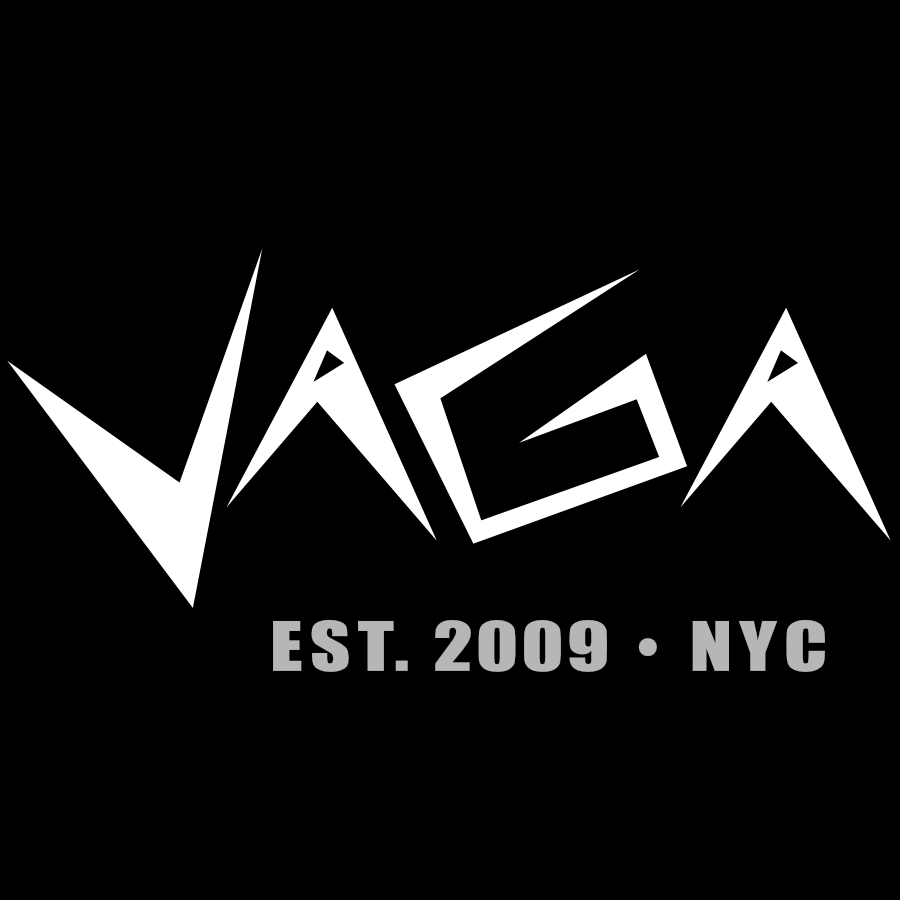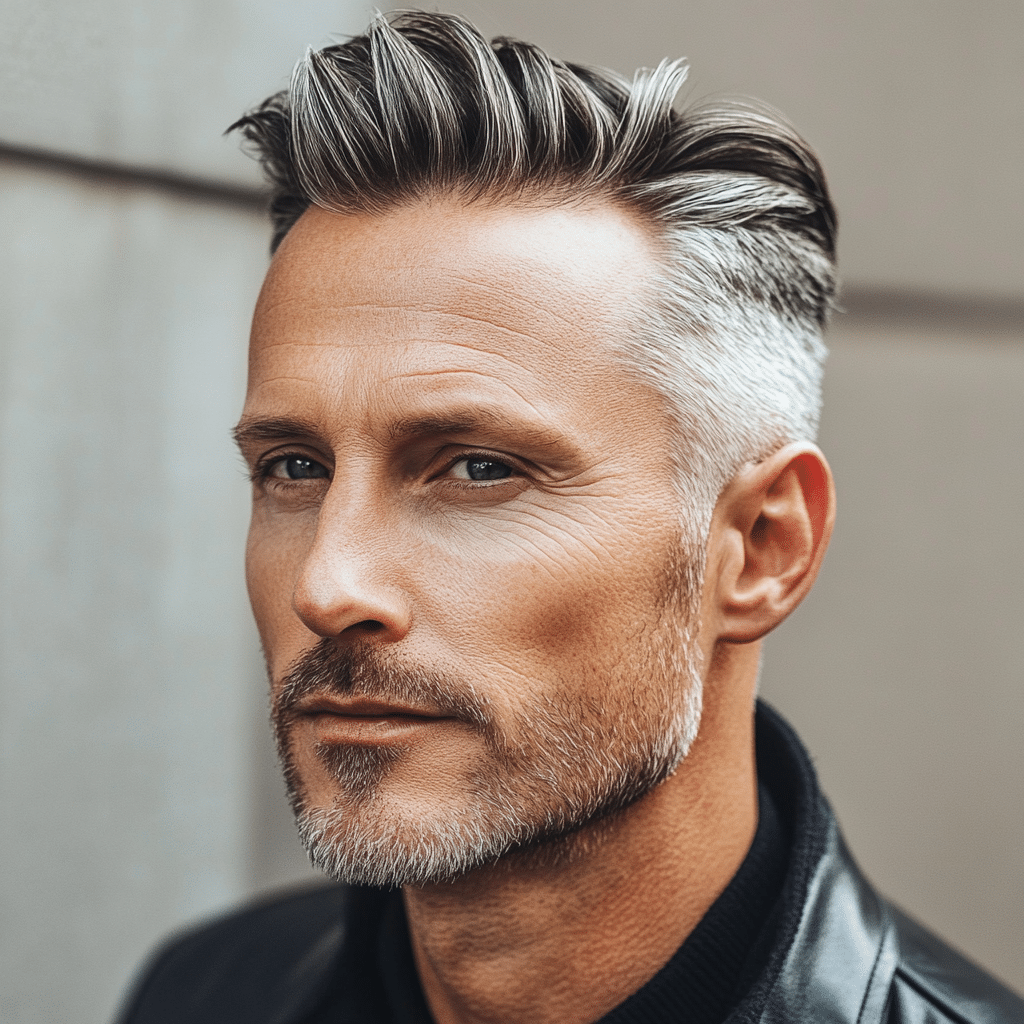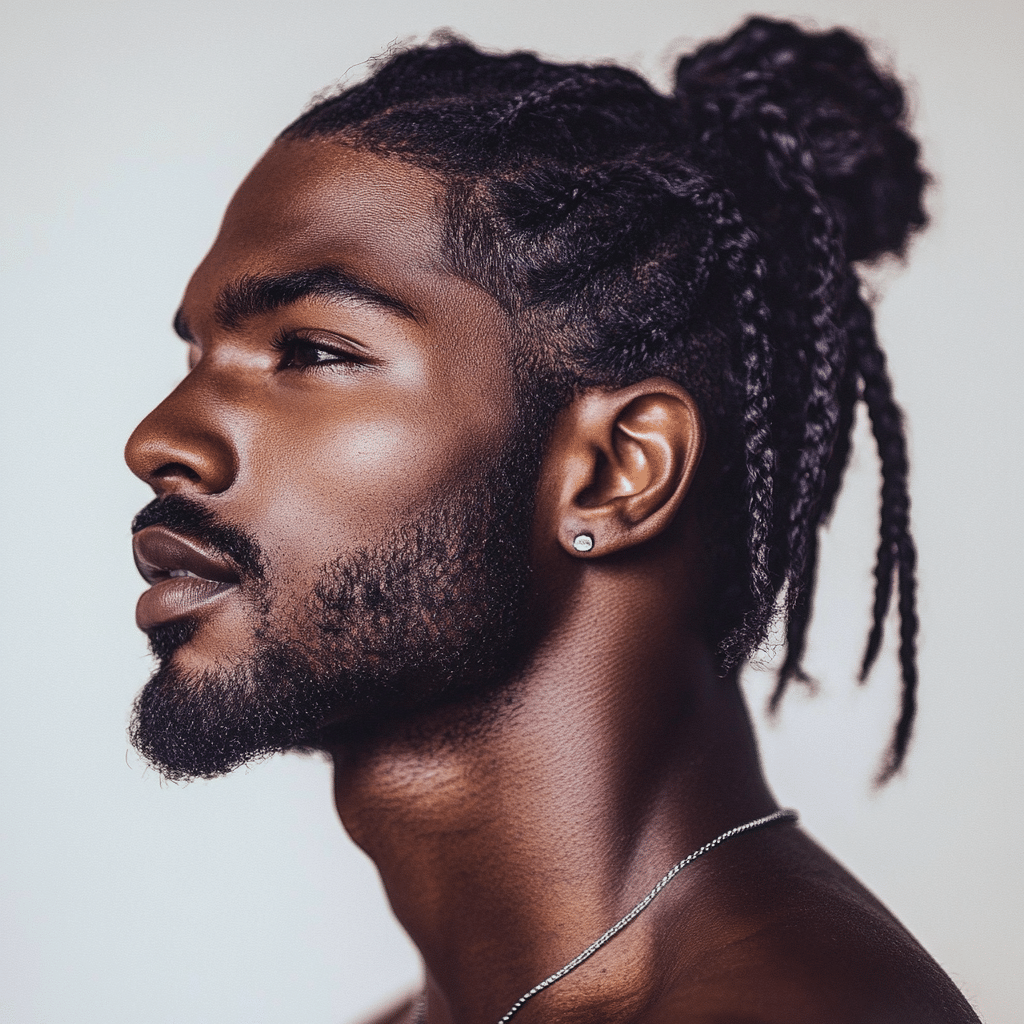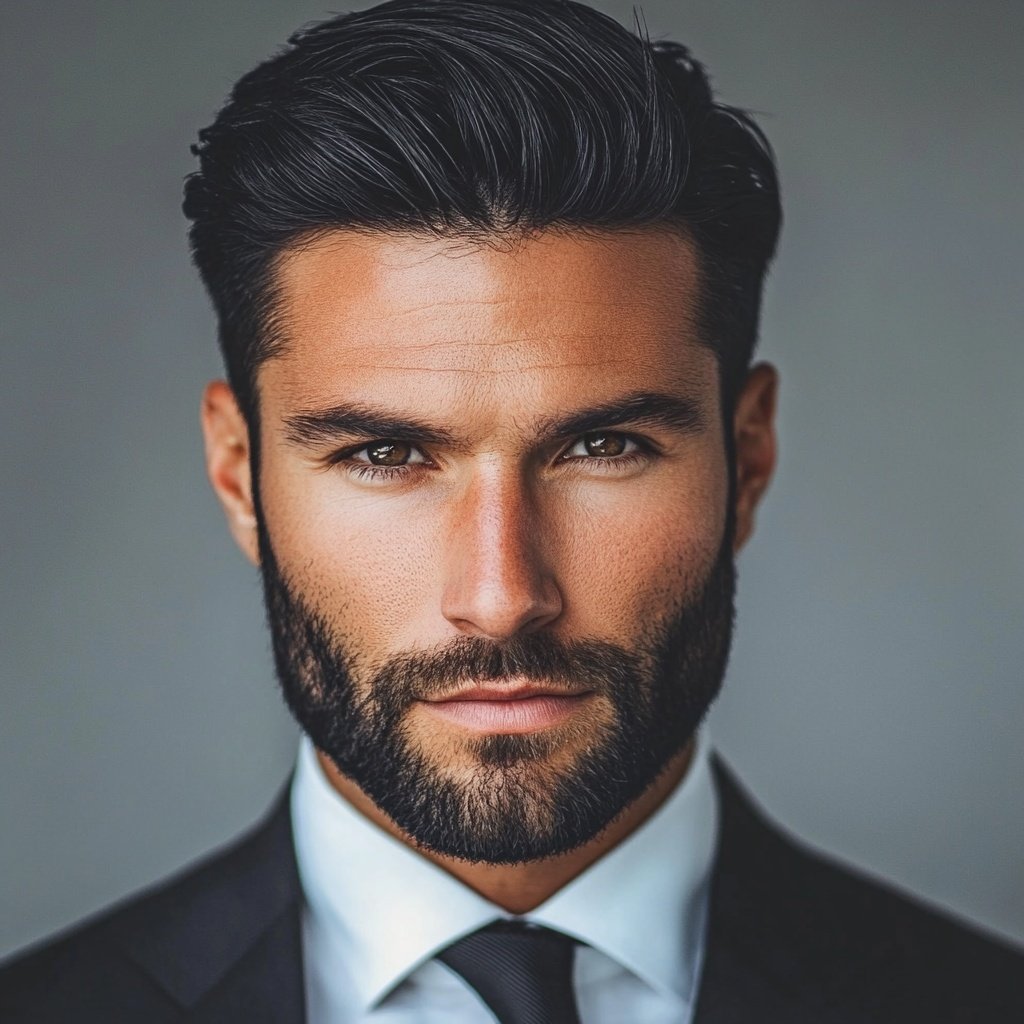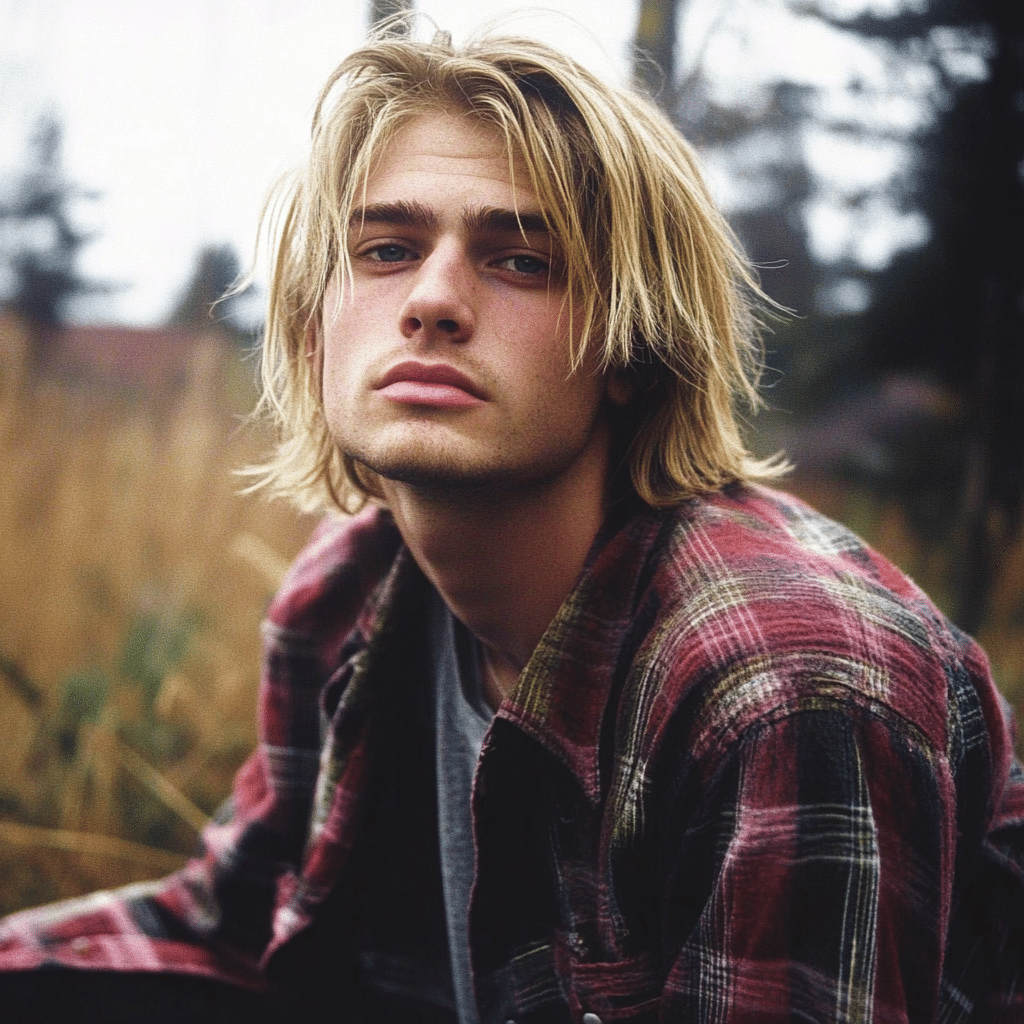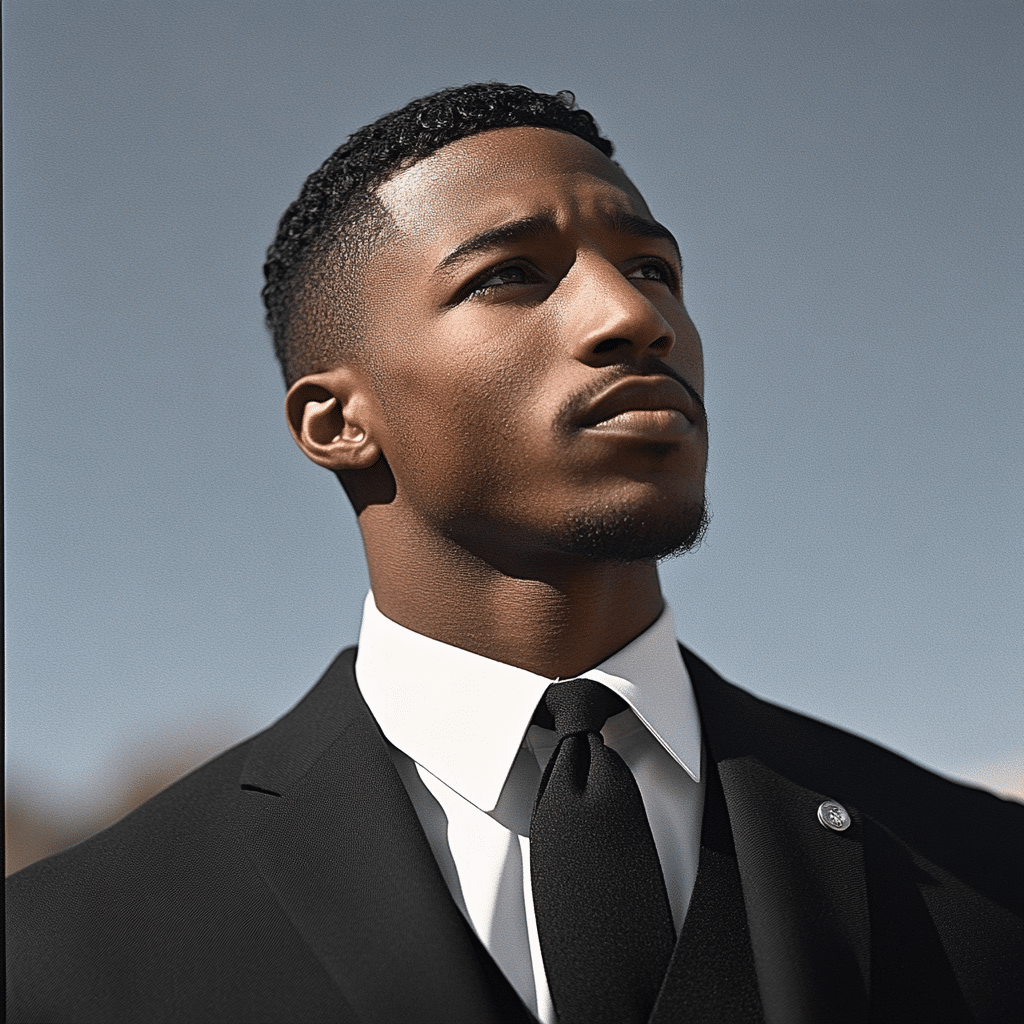25 Modern Mullet Hairstyles: How-To Guide & Maintenance Tips
The modern mullet haircut has become one of the most popular men’s haircuts, blending the classic short-front, long-back formula with contemporary fades, textured layers, and precision styling that feels fresh and intentional.
What is a Modern Mullet Haircut?
The modern mullet is a revival of the signature mullet shape with shorter hair at the front and sides with longer length at the back, but updates it with clean tapers, fade variations, blended layers, and textured cutting techniques.
Unlike the 1980s version, today’s modern mullet is refined and versatile, ranging from subtle business-appropriate styles to bold, statement-making looks.
In 2026, the modern mullet is one of the biggest men’s hair trends, defined by hybrid styles that combine its signature length with fades and clean, modern shaping.
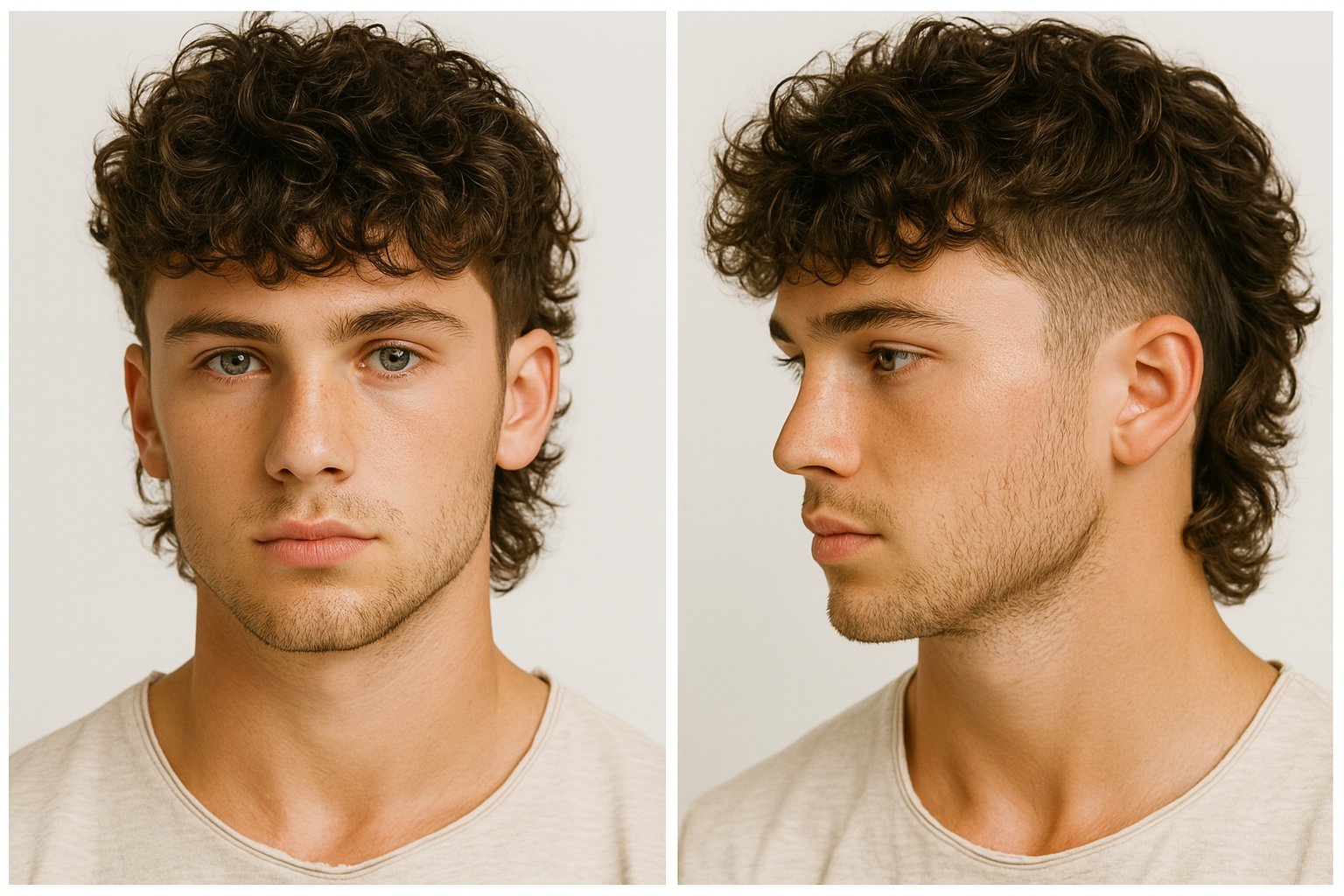
Key features of a modern mullet:
– Tapered or faded sides for a sharp, for contemporary edge
– Textured layers on top for volume and movement
– Flowing length at the back that can be styled sleek or messy
– Customizable proportions to suit different face shapes and hair types
It is a haircut that can be both polished and wild, classic and undeniably trendy.
22 Modern Mullet Haircuts and Variations:
The modern mullet works across different face shapes when styled strategically. Round faces look best with volume on top to add height.
Angular or square faces pair well with structured fades and clean lines. For longer face shapes, softer layers and textured movement create balance.
1. Modern Mullet with Taper Fade
This version trims the back short while leaving some volume on top. A subtle low taper fade cleans up the sides. The low taper fade creates clean side transitions while maintaining the signature back length. The contrast feels intentional rather than dramatic.
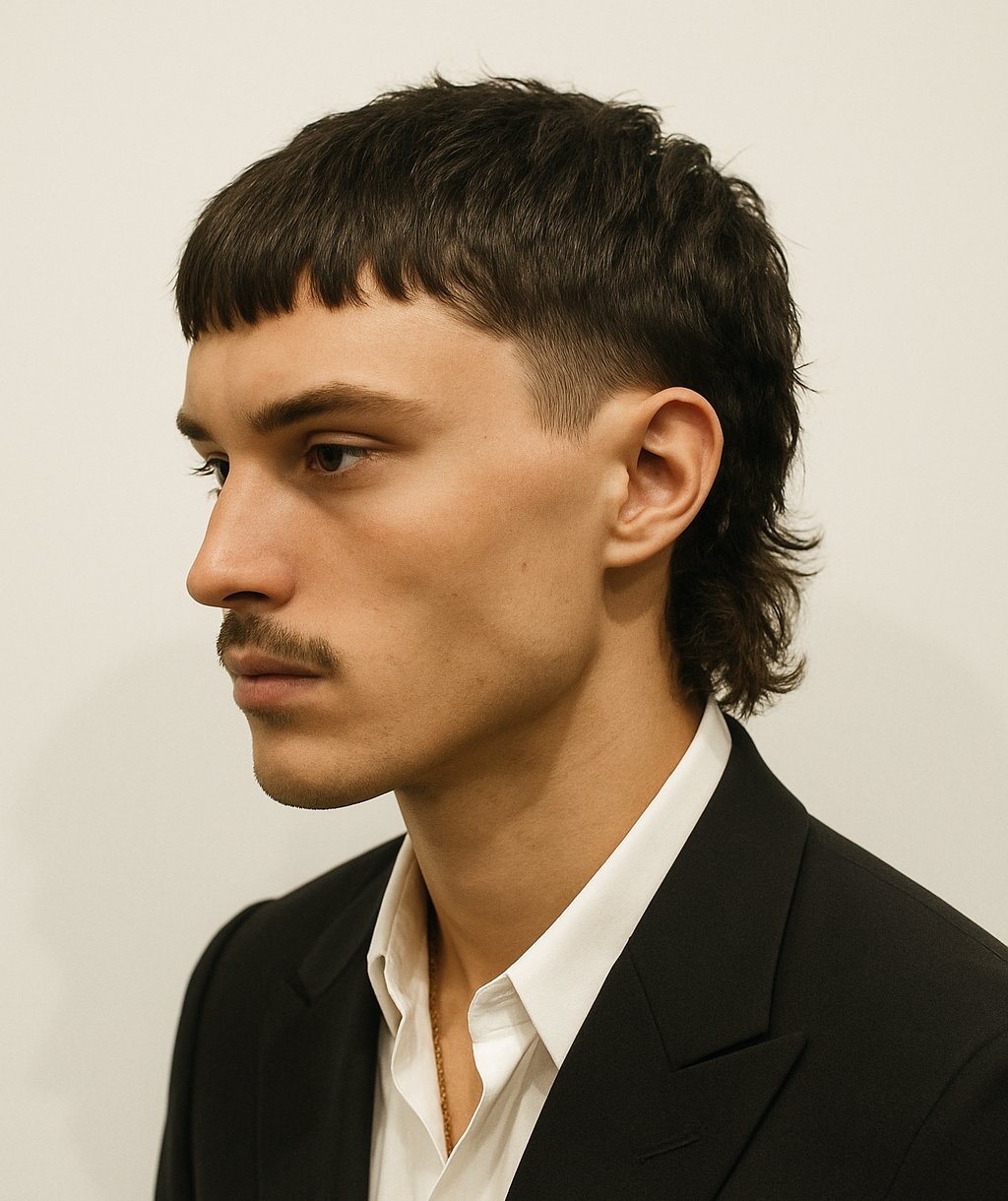
Hair type: Works on all textures, especially effective on straight to wavy hair
Maintenance: Every 3-4 weeks for fade touch-ups
Styling tip: Use matte clay for texture definition and sea salt spray for natural movement. Daily styling takes 5-10 minutes.
2. Modern Mullet with Messy Texture
Think messy front, tapered sides, and a lived-in back that looks like you just woke up cool. Perfect for guys with straight or wavy hair who want a little rock ‘n’ roll in their routine.
Features deliberately tousled front sections, precision-tapered sides, and naturally flowing back length.
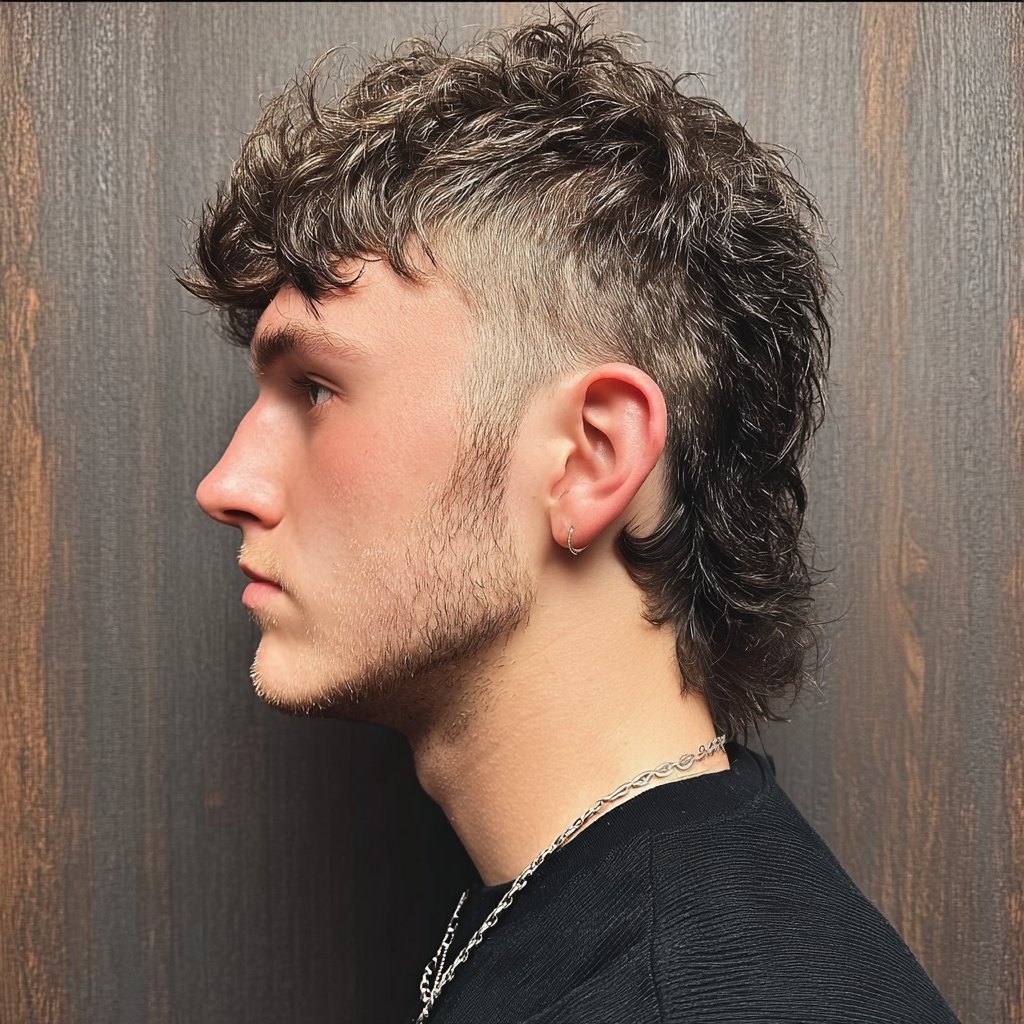
Hair type: Straight to wavy, medium thickness
Maintenance: Every 4-6 weeks
Styling tip: Apply texturizing paste for separation and light hold spray for movement. Request “choppy layers” in the fringe area for authentic texture.
3. Shaggy-Layered Modern Mullet
The shag mullet is peak ’70s meets the 2020s. This style does not include a fade, but is still a modern mullet in the sense that it creates a hybrid style with choppy layers from crown to nape.
It softens the silhouette without losing that rebellious vibe. Add a little fringe in the front, and you’re golden.
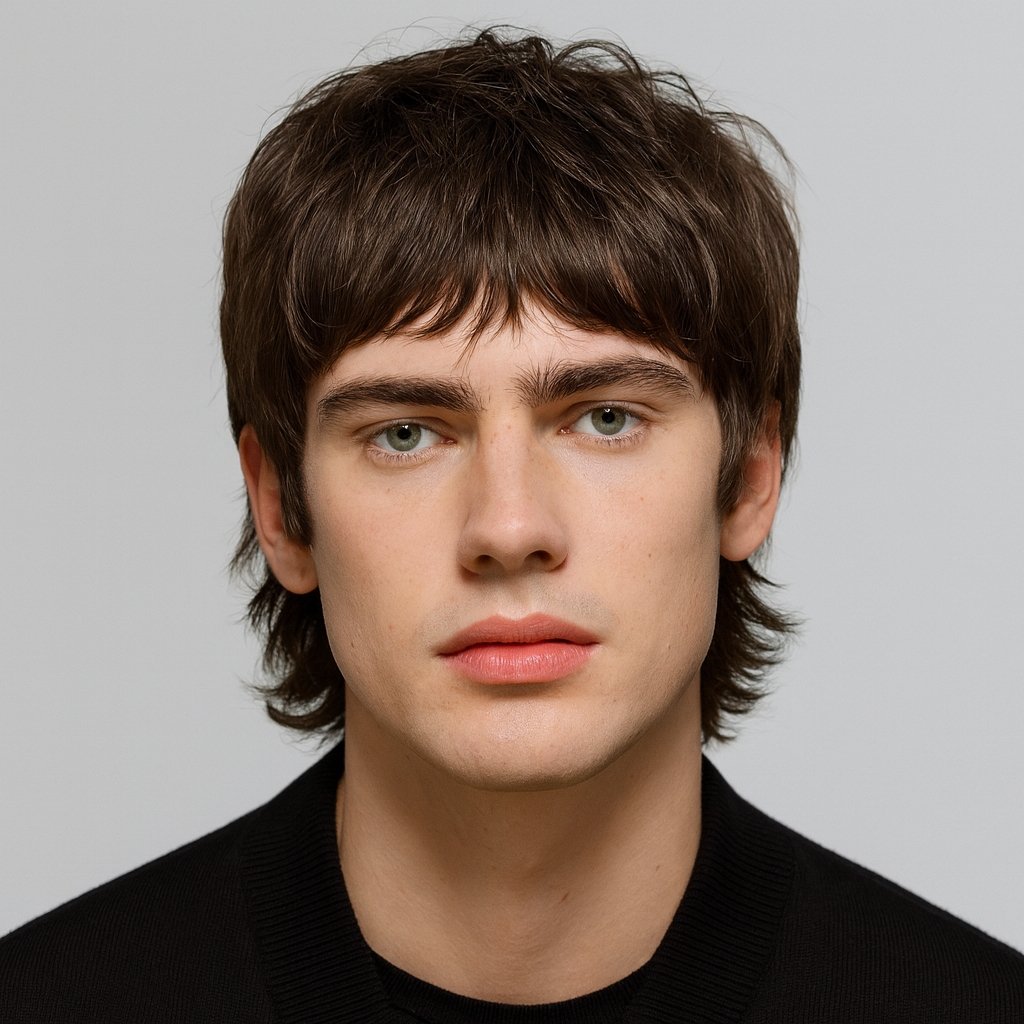
Best for: Vintage-modern fusion aesthetic
Hair type: All textures, particularly effective on wavy hair
Maintenance: Every 5-6 weeks for layer refresh
Styling tip: Use volumizing mousse for lift and lightweight oil for shine without weight. Goes well with retro 70s outfits.
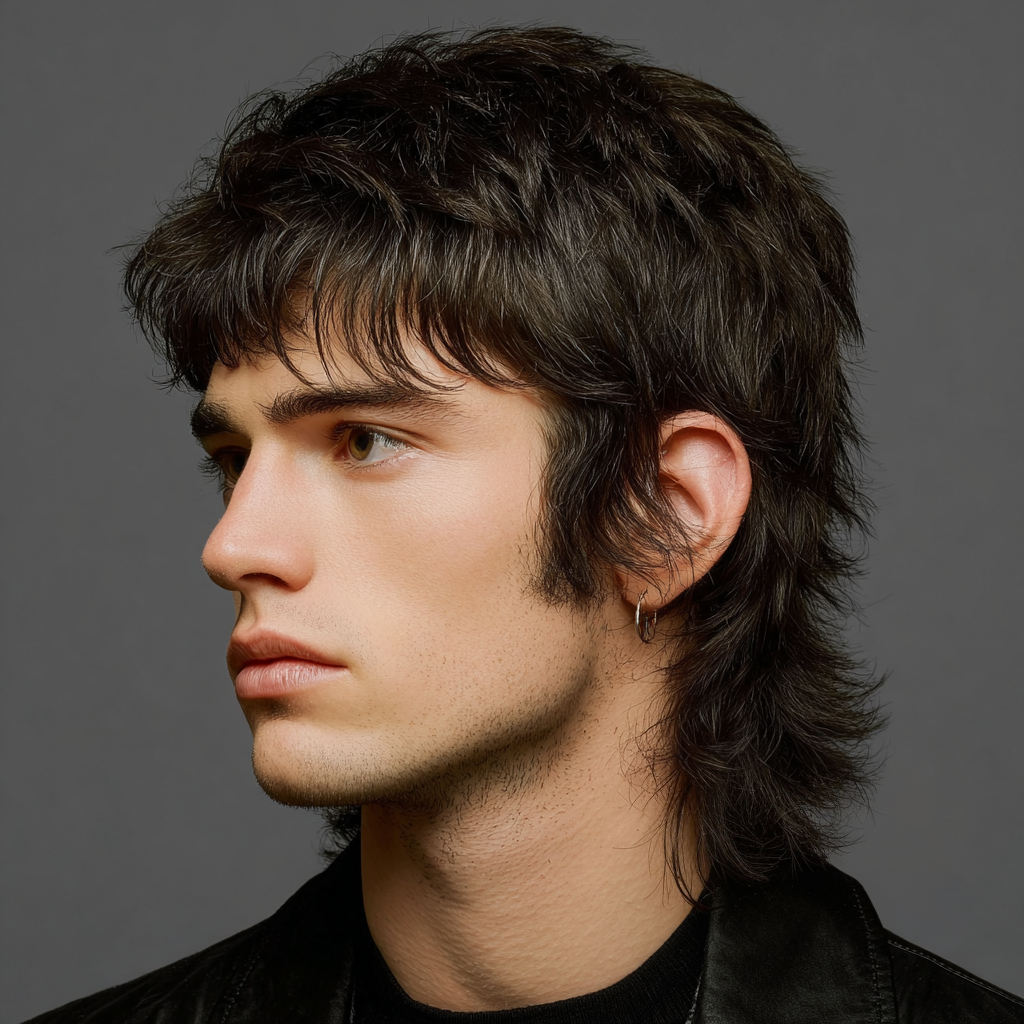
Extra Tip: It goes well with retro 70s outfits and a bit of eyeliner, just saying.
4. Curly Textured Modern Mullet with Taper
Let the curls shine. The taper around the ears gives structure, while the top and back stay loose and voluminous. This is the one for texture-rich hair types that refuse to be tamed.
Requires a curl-experienced barber and dry cutting techniques.
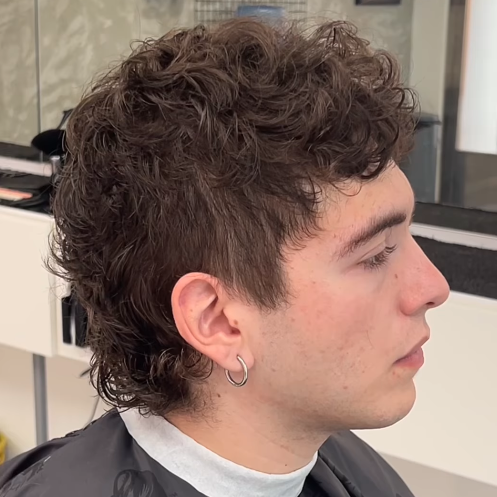
Hair type: Curly to coily textures (3A-4A curl patterns)
Maintenance: Every 4-5 weeks for shape maintenance
Styling tip: Use the scrunching method with curl cream and leave-in conditioner for defined, healthy curls. Diffuse on low heat if needed.
5. Burst Fade Mullet Haircut
The fade haircut here curves around the ear in a perfect burst, giving way to a tight top and flowing back. It’s sculpted and clean, and when done right, feels almost futuristic.
The burst fade mullet follows the natural curve of the ear, forming clean arcs that contrast sharply with the longer, flowing length at the back.
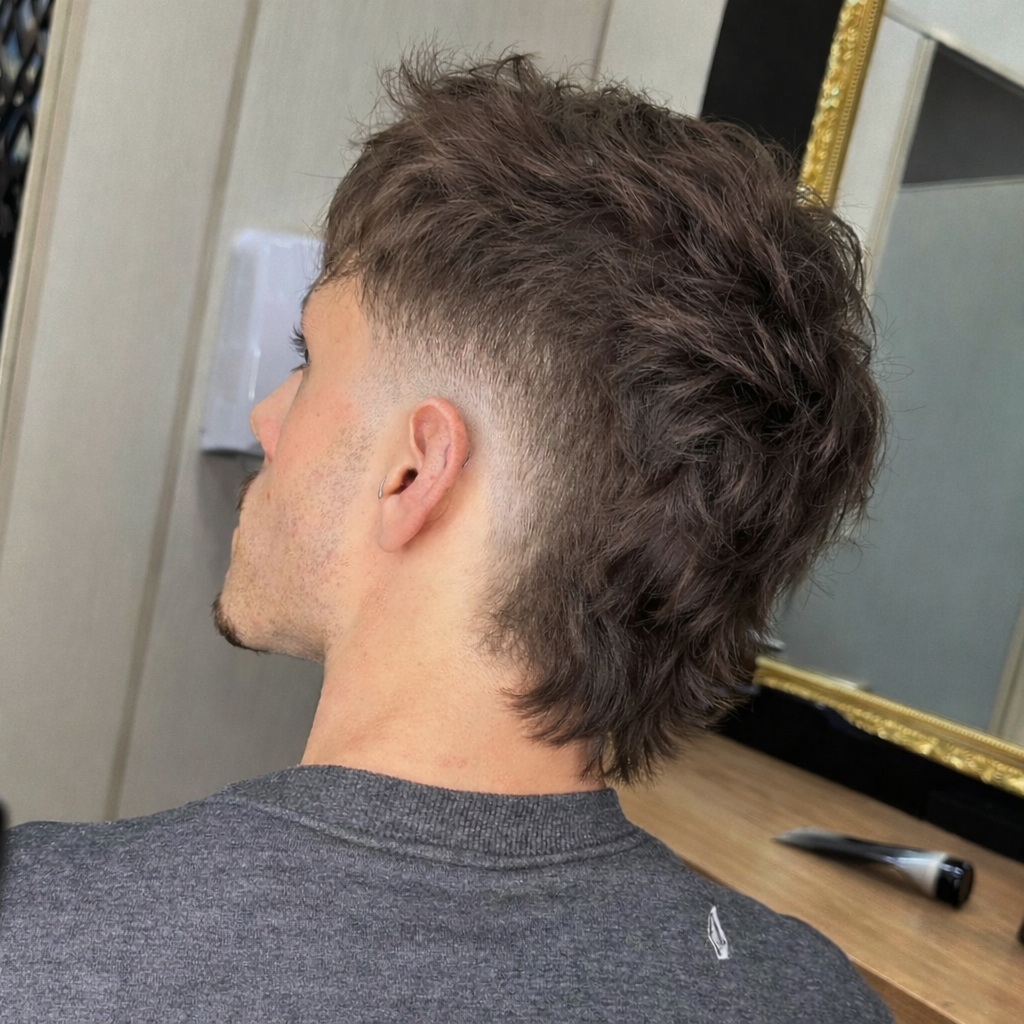
Hair type: Thick to medium density, straight to wavy
Maintenance: Every 2-3 weeks for fade perfection
Styling tip: Minimal styling needed due to structural precision—light pomade for definition and optional texturizing for movement.
6. Wavy Modern Mullet Haircut
The softest take on the trend. It flows with your natural waves and requires minimal styling. Pair it with a loose low taper or even grown-out sides for a chill, effortless vibe.
Hair type: Natural waves (2A-2C patterns)
Maintenance: Every 6-8 weeks
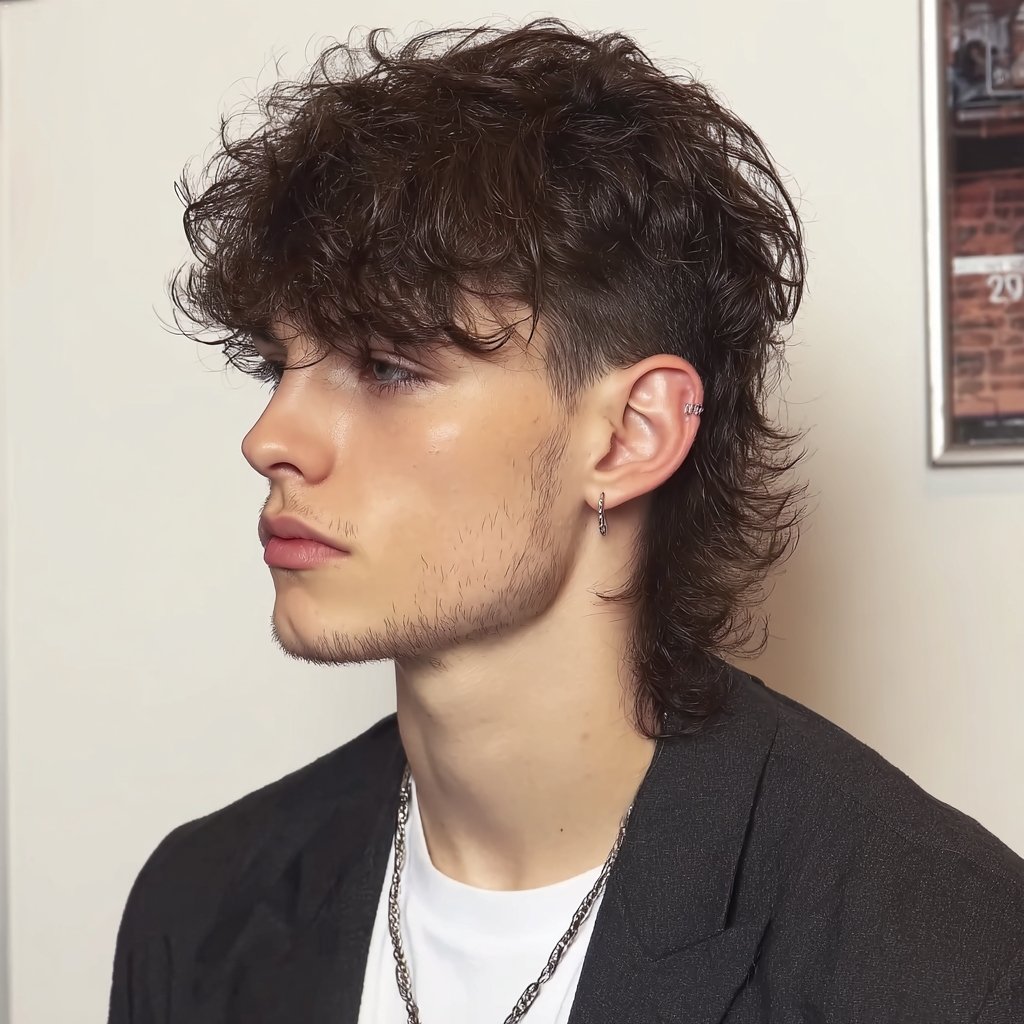
Works with natural wave patterns rather than against them. Requires minimal daily styling while offering maximum versatility. Can be enhanced for formal occasions or left natural for casual wear.
Wave-enhancing techniques:
- Sea salt spray application on damp hair
- Scrunching method during drying
- Air-drying preferred over blow-drying
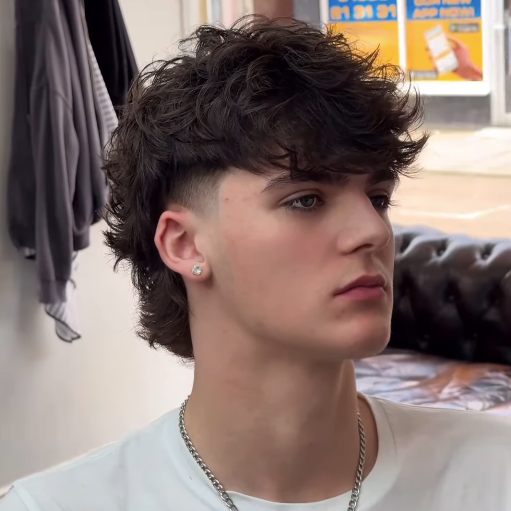
Hair type: Natural waves (2A-2C patterns)
Maintenance: Every 6-8 weeks
Styling tip: Apply sea salt spray to damp hair and scrunch while air-drying. Can be slicked back for professional settings or tousled for weekend casual.
7. K-Pop Inspired Sleek Mullet
Draws from Korean pop culture aesthetics with polished precision and dramatic volume contrasts. Features feathered layering, pronounced crown height, and often incorporates color elements.
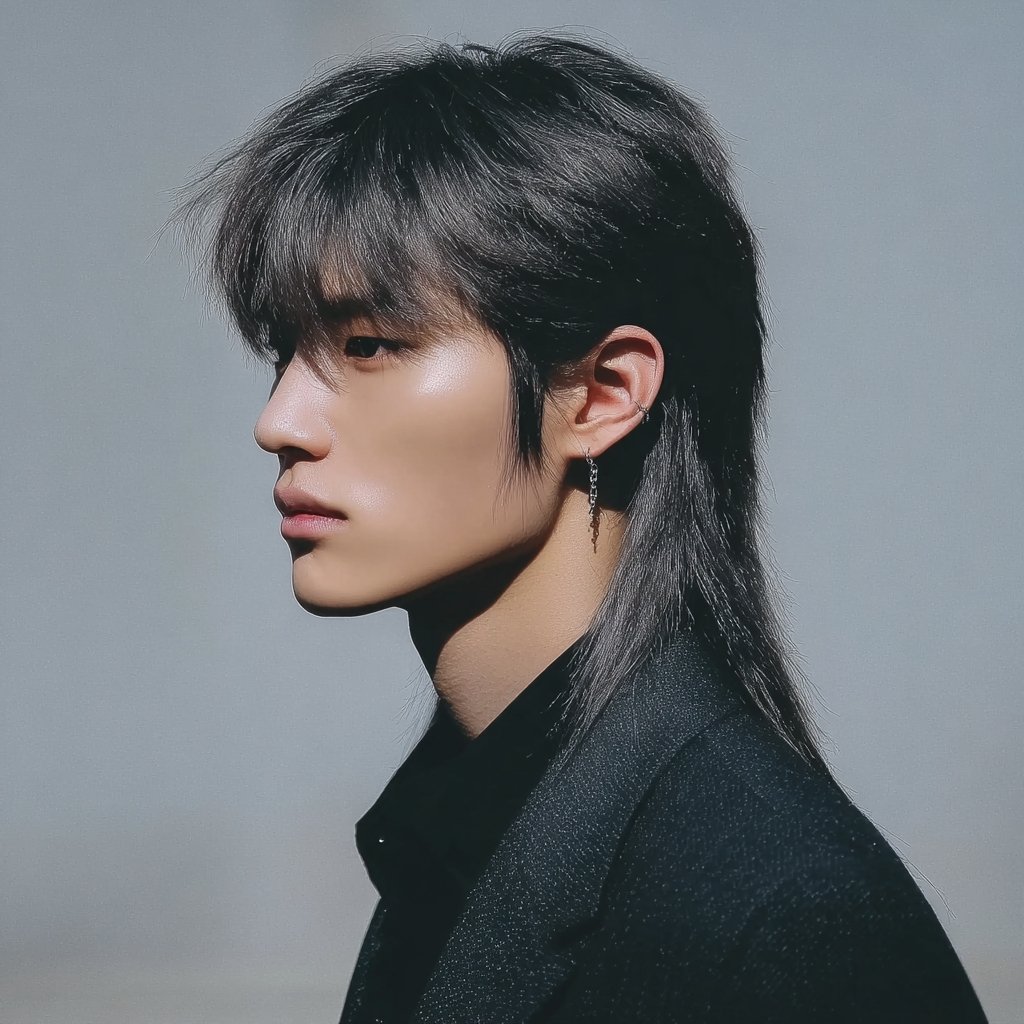
Explore more: The Asian Mullet: Challenging Traditions
Hair type: Straight, thick hair that holds structure
Maintenance: Every 3-4 weeks for precision
Styling tip: Use heat styling tools (blow dryer, possible straightener) with strong-hold products. Requires 15-20 minutes daily styling commitment.
8. High Fade Modern Mullet
Creates aggressive contrast through high temple fades while maintaining substantial top and back length. This bold variation makes immediate visual statements and suits confident personalities.
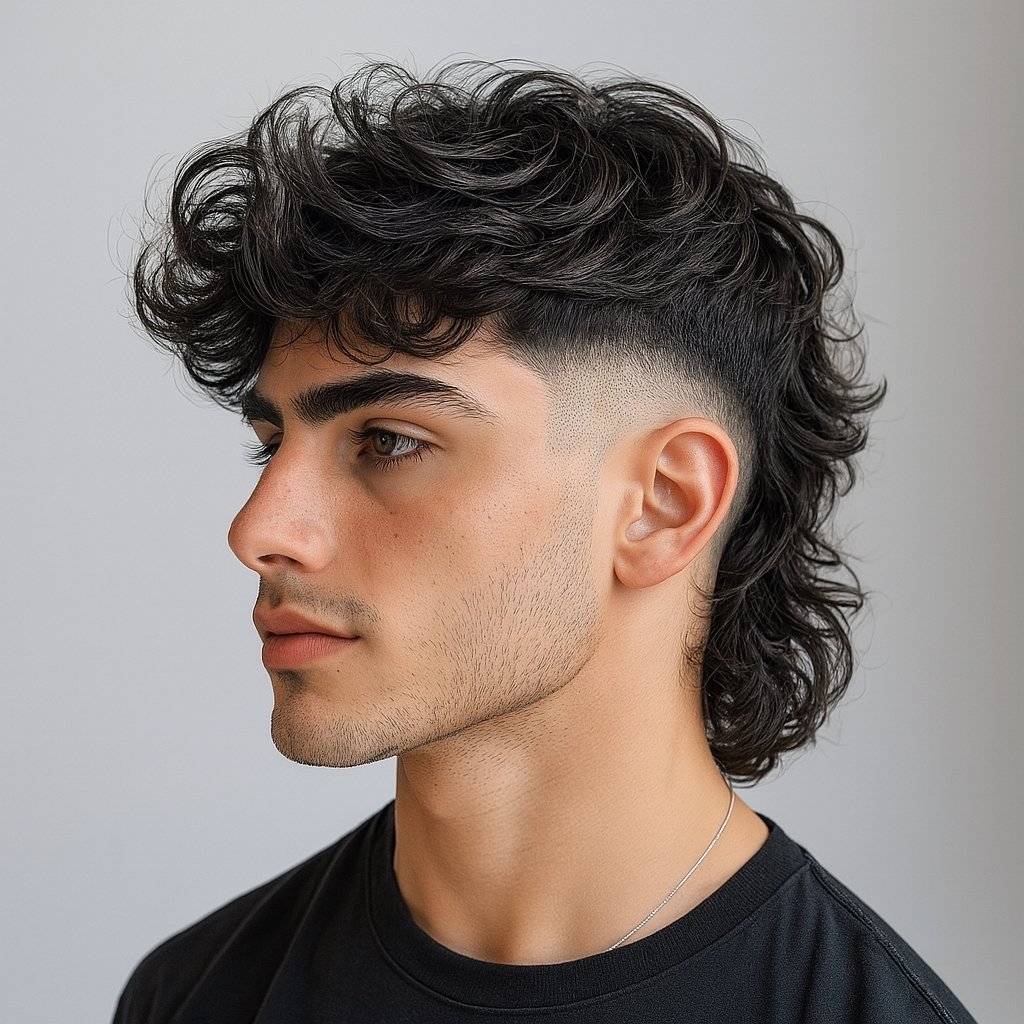
Hair type: Thick, straight hair for optimal impact
Maintenance: Every 2-3 weeks for fade maintenance
Styling tip: Daily styling essential. Use strong-hold pomade for definition and blow-dry for volume enhancement. Works well on thick or straight hair.
9. The Sporty Modern Mullet
This one’s straight off the pitch, mid taper fade, a little height up top, and a loose but intentional back. You’ve probably seen it on your favorite La Liga or Premier League star.
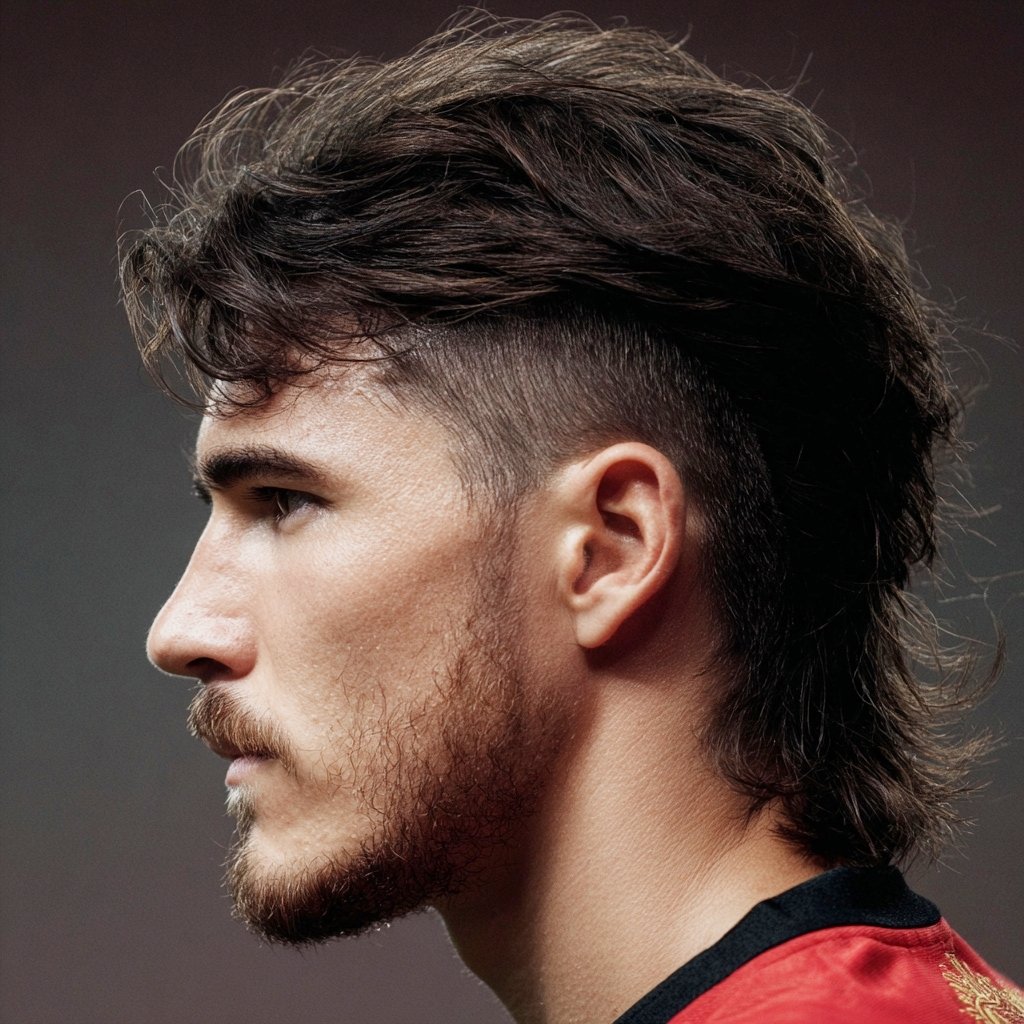
Hair type: Medium to thick density for volume retention
Maintenance: Every 4-5 weeks
Styling tip: Use sweat-resistant light hold cream or leave it loose. Quick post-workout refresh capability maintains shape during physical activity.
10. V-Shaped Mullet with Tapered Sides
Here’s one for detail-lovers. The nape comes to a soft point, creating a V-shape that’s clean and unique. Tapered sides keep it tight without going full fade, and the top stays textured.
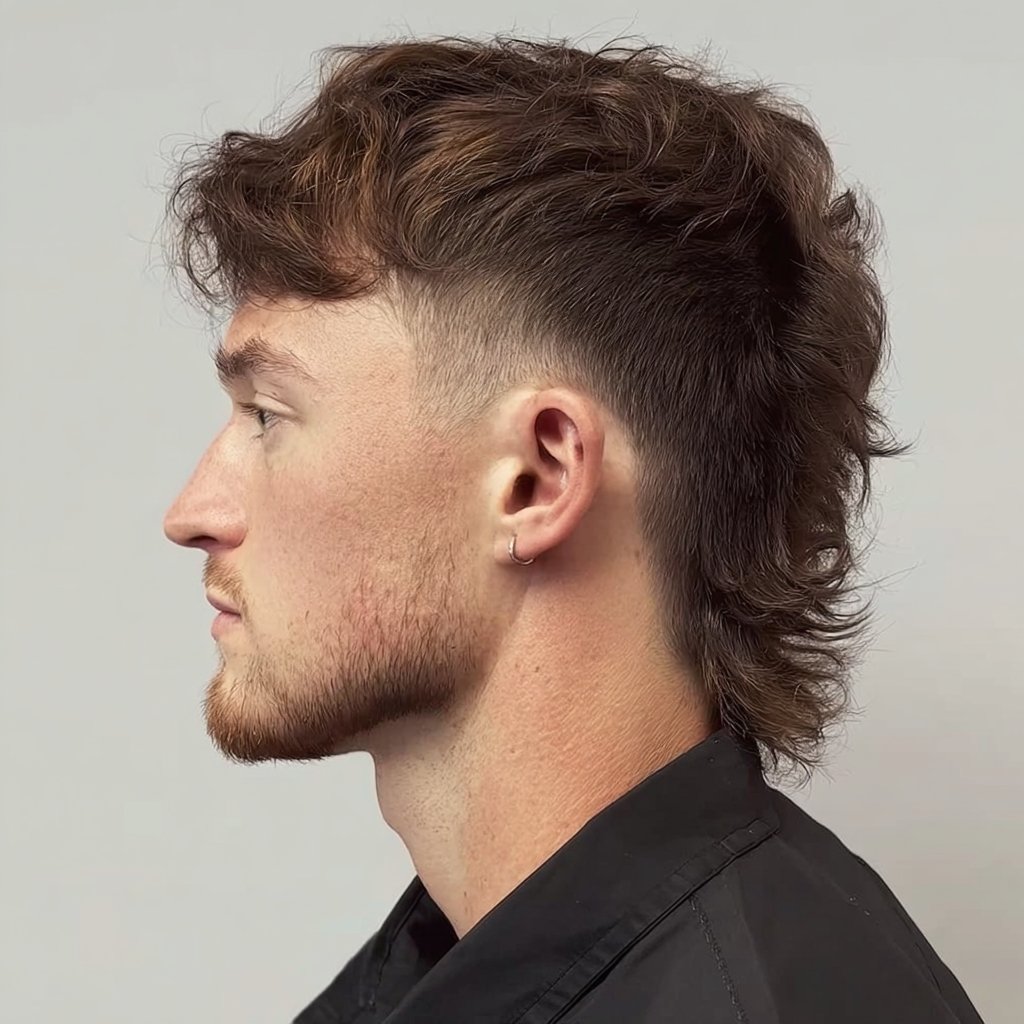
Hair type: Straight to slightly wavy for clean lines
Maintenance: Every 4-5 weeks for V-shape precision
Styling tip: Ask your barber for razor detailing at the neckline. Keep top textured with light product for contrast against the sharp V-shape.
11. Flow Mullet
The flow mullet emphasizes natural movement and length throughout, with minimal layering and maximum flow from front to back. Popular among surfers, skaters, and soccer players, this relaxed variation lets hair grow longer on top and in back while keeping sides relatively short.
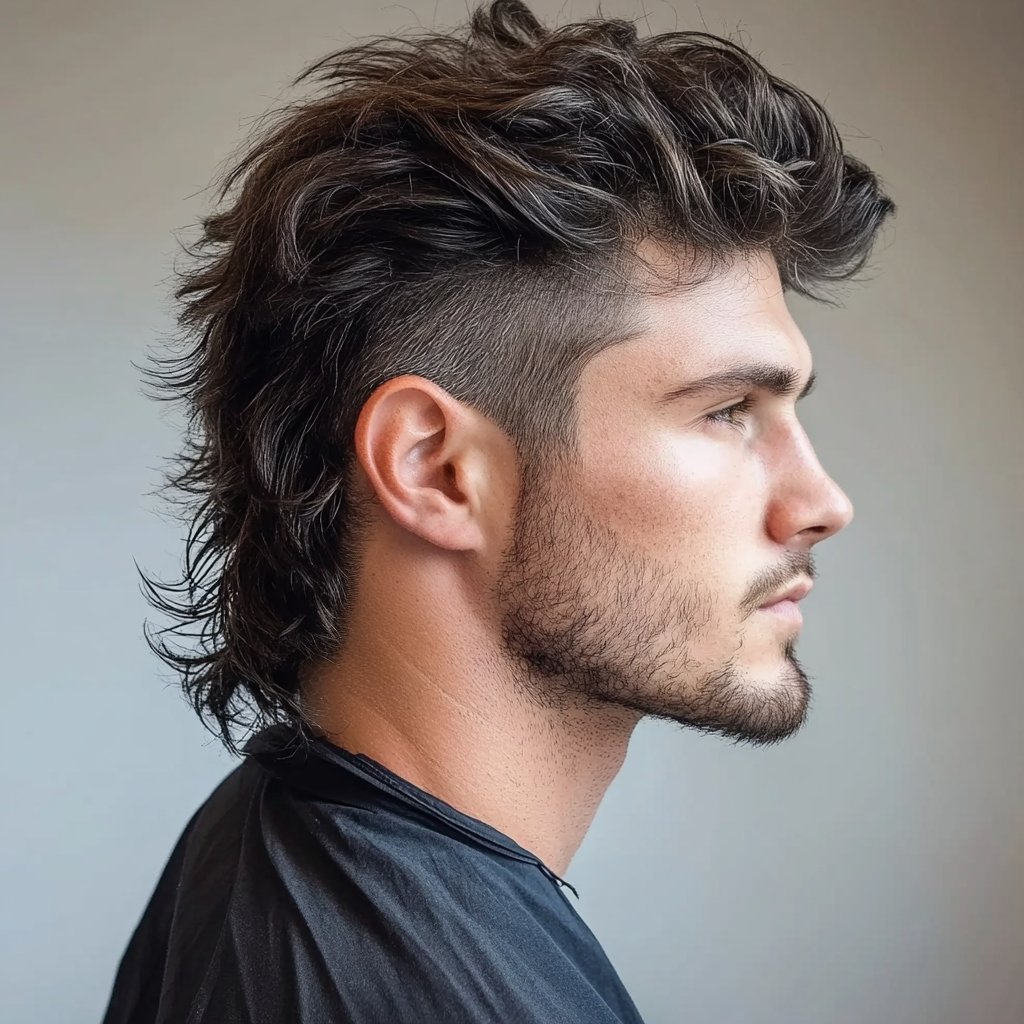
Hair type: Wavy to straight, medium thickness
Maintenance: Every 6-8 weeks
Styling tip: Let it air dry with sea salt spray for natural texture, or blow-dry loosely without heavy product. The goal is effortless movement, not structured styling.
The trick is letting your hair do its thing: straight, wavy, or even a curly textured mullet, whatever.
12. Grunge Modern Mullet
The grunge modern mullet channels 90s alternative rock with deliberately messy, lived-in texture and an “I woke up like this” vibe. This low-maintenance variation features choppy, uneven layers throughout and embraces natural texture without polished styling; think Kurt Cobain meets modern edge.

This modern textured haircut also has some grunge vibes on it.
Hair type: All textures, especially wavy or straight
Maintenance: Every 5-7 weeks or let it grow out
Styling tip: Skip the blow dryer and let hair air dry with minimal product. A tiny bit of texturizing paste adds separation, but the messier and more undone, the better.
13. Mod Cut Modern Mullet
The mod cut mullet blends 1960s British mod style with the mullet’s signature back length, featuring a clean, geometric fringe and structured layers on top that contrast with the longer, flowing back.
This retro-inspired variation offers a sharp, fashion-forward look that nods to vintage style while staying contemporary.
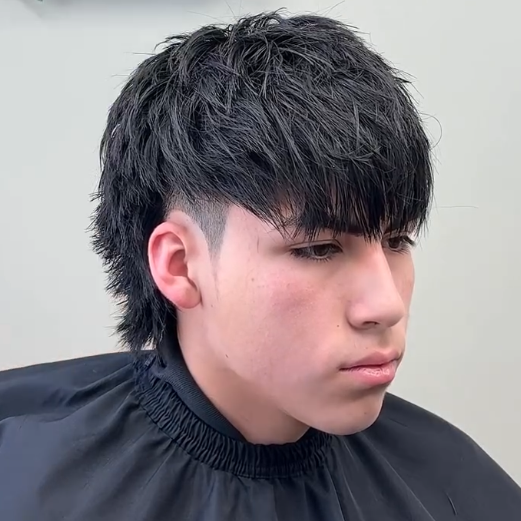
Hair type: Straight to slightly wavy, medium thickness
Maintenance: Every 4-5 weeks to keep lines sharp
Styling tip: Use light pomade or styling cream to keep the fringe defined and the top smooth. The structured front and flowing back create natural contrast without heavy styling.
14. European-Style Mullet
The European-style mullet keeps the attitude of a classic mullet but refines it with softer proportions and a low, natural taper. The sides are clean without harsh fades, the top stays textured and controlled, and the back flows subtly rather than dramatically.
The result feels intentional, modern, and fashion-led, more Paris runway than throwback rebellion.
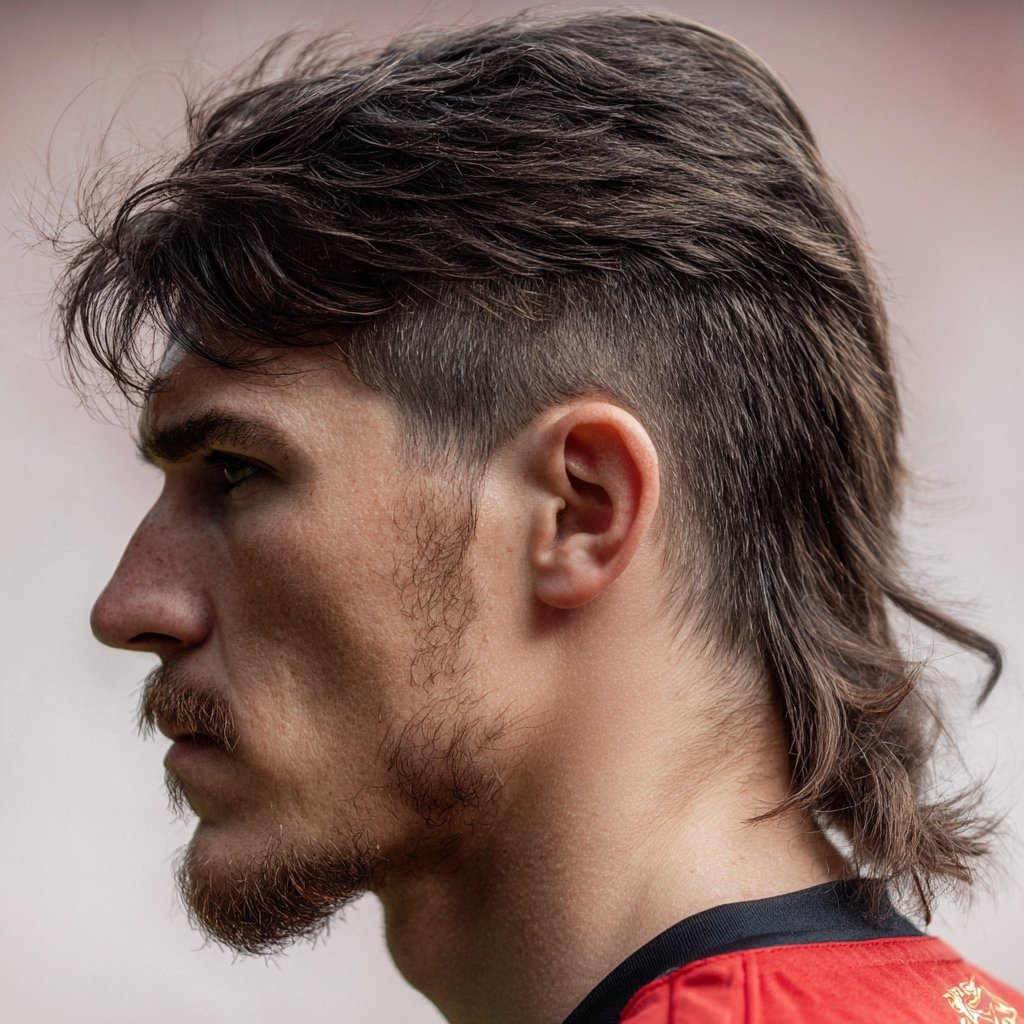
Hair type: Straight to slightly wavy, fine to medium density
Maintenance: Every 5–6 weeks to maintain the taper and shape
Styling tip: Use a lightweight matte cream or soft wax. Work it through the top and back with your fingers to keep movement natural and avoid over-defining the silhouette.
15. High Taper Mullet
The high taper mullet features a fade that starts high on the head, near the temple area, creating dramatic contrast between the closely cropped sides and the longer top and back. This bold variation emphasizes vertical height and showcases the mullet’s flow while keeping the sides ultra-clean and sharp.
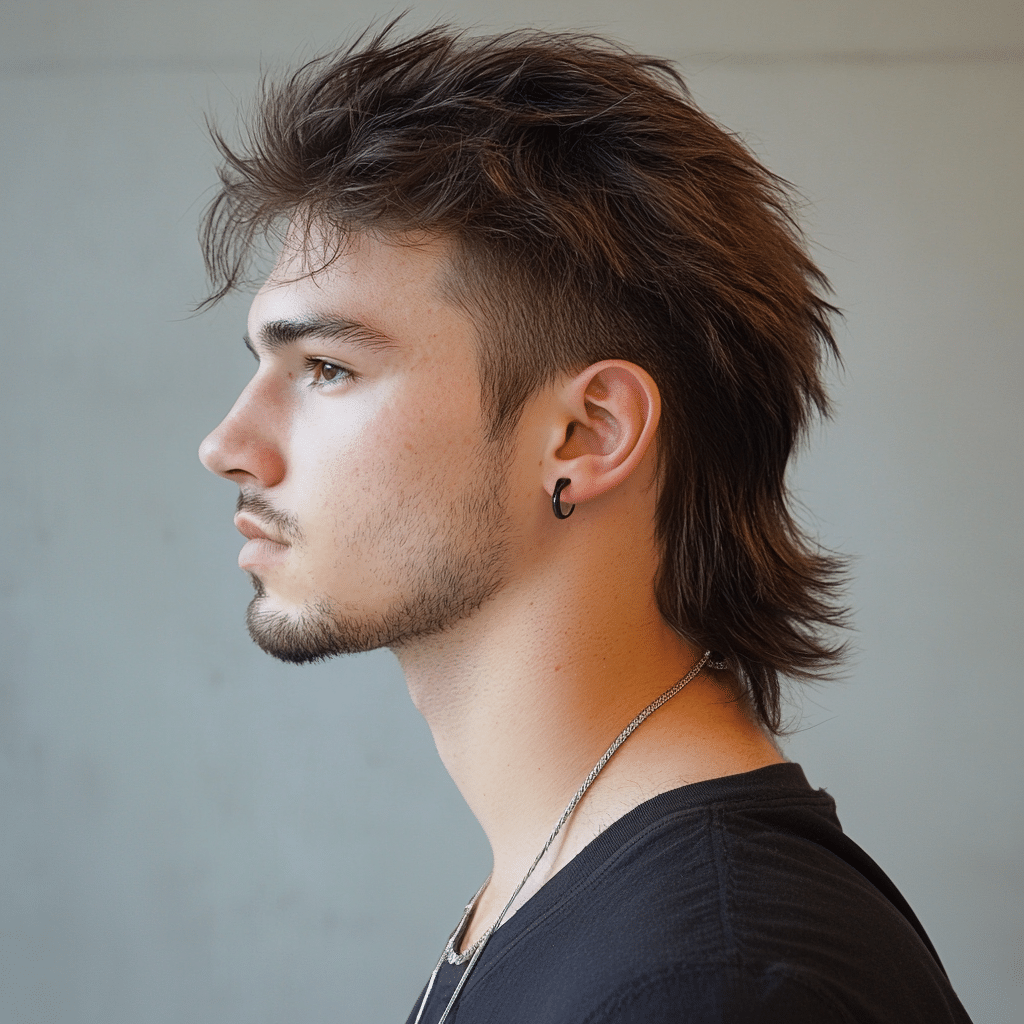
Hair type: Medium to thick hair for volume on top
Maintenance: Every 2-3 weeks to keep the high taper fresh
Styling tip: Blow dry the top upward and back for maximum height, using matte clay or pomade for texture and hold. The dramatic taper does the visual work, keep the top textured for balance.
16. Undercut Modern Mullet Haircut
The undercut mullet creates a dramatic contrast by completely disconnecting the top and back from the shaved or buzzed sides.
A sharp separation that makes a bold statement. This high-impact version emphasizes the mullet’s signature length while keeping the sides clean and minimal.
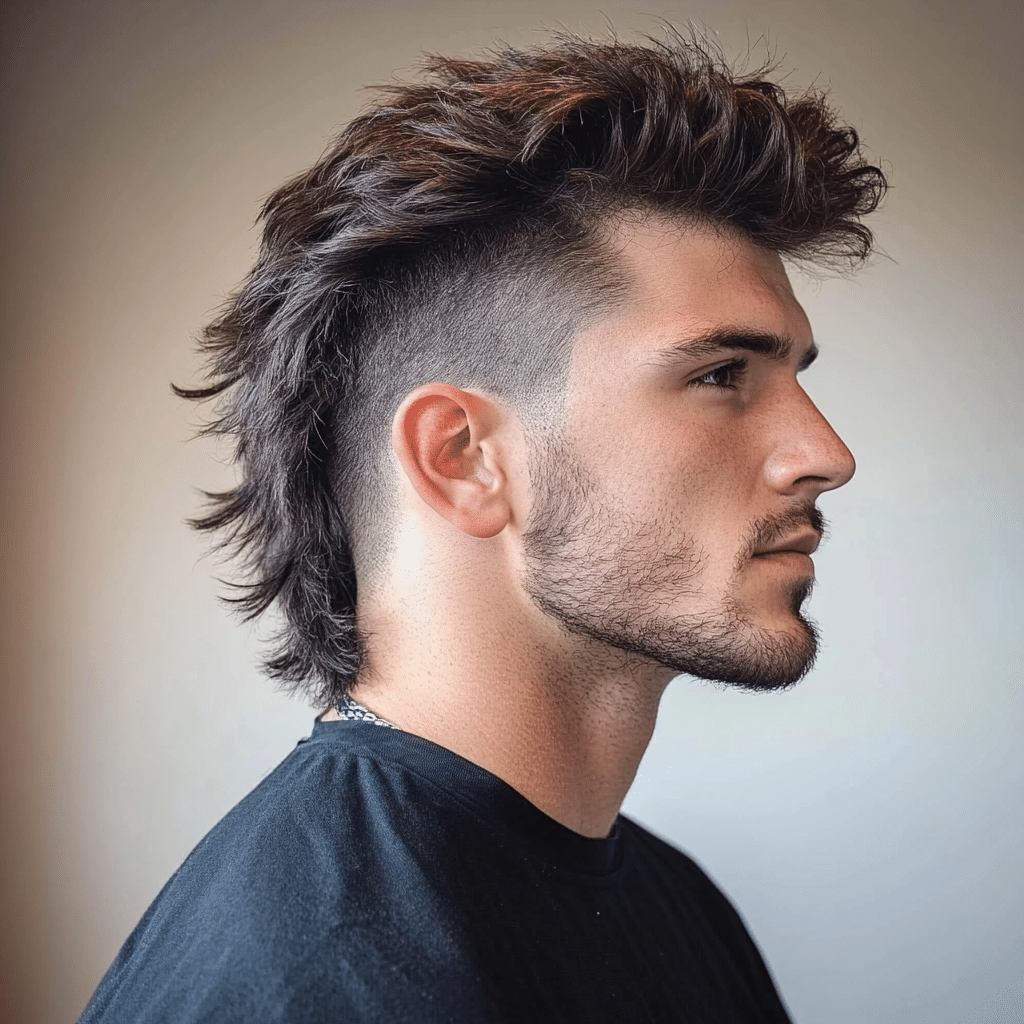
Hair type: Medium to thick hair for optimal volume on top
Maintenance: Every 3-4 weeks to keep the undercut sharp
Styling tip: Use pomade or styling cream on the top for a sleek, defined look, or leave it textured and natural.
Explore More: 15+ Undercut Hairstyles for Men of All Ages
17. Wolf Cut Modern Mullet
The wolf cut mullet blends heavy, shaggy layering throughout the crown and top with the mullet’s signature longer back, creating a wild, textured look with maximum volume and movement. This hybrid style combines the best of both cuts: choppy, face-framing layers up front with flowing, feathered length in back for an edgy, rock-inspired aesthetic.
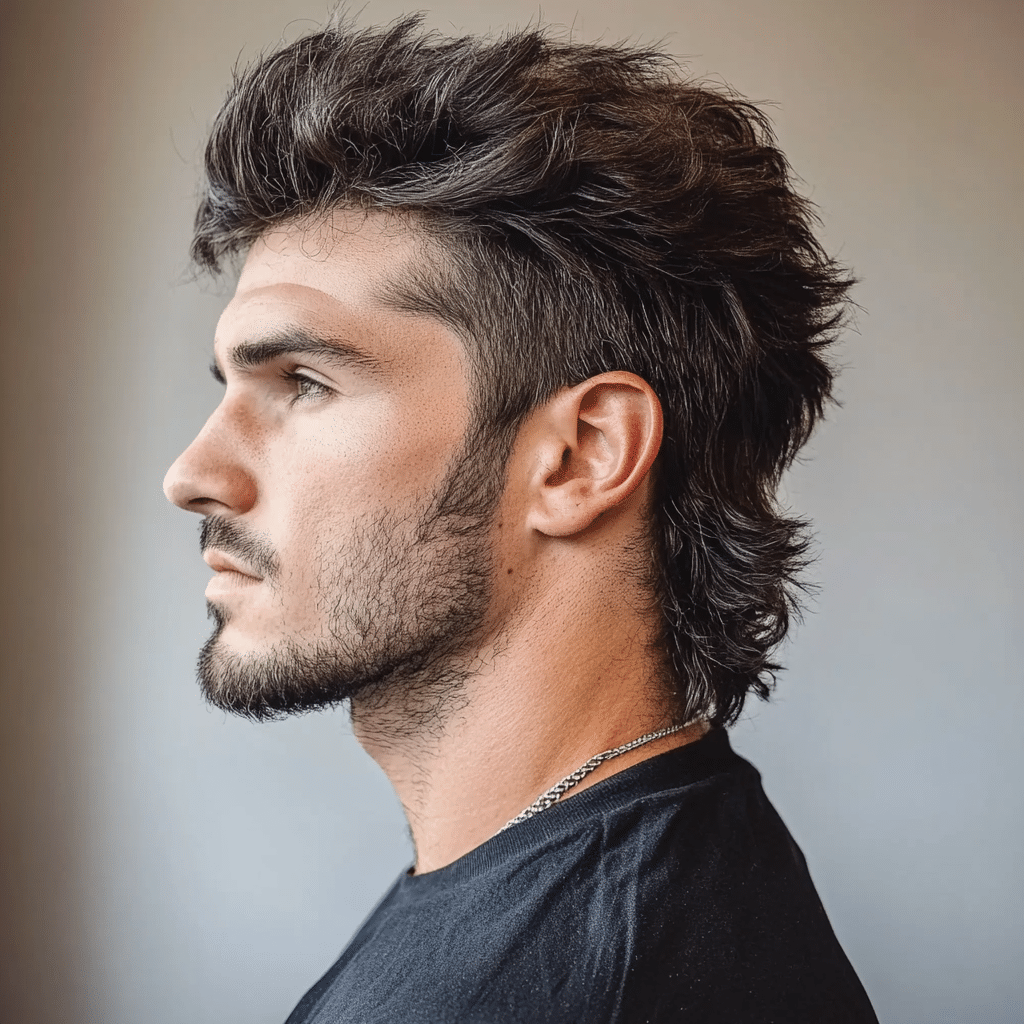
Hair type: All textures, especially effective on wavy to curly
Maintenance: Every 5-6 weeks to maintain layers
Styling tip: Apply sea salt spray or texturizing spray to damp hair and scrunch or tousle with your fingers. Let it air dry for natural, messy volume—the more lived-in, the better.
18. Middle Part or Two Block Mullet
The middle part mullet features a center-parted fringe that flows into curtain bangs, creating a softer, more fashion-forward take on the classic cut. This style works especially well with naturally straight or wavy hair and has become popular through K-pop and streetwear influences.

Hair type: Straight to wavy, medium thickness
Maintenance: Every 4-5 weeks
Styling tip: Apply a small amount of styling cream to damp hair, part down the center, and let it air dry or blow dry forward for natural movement.
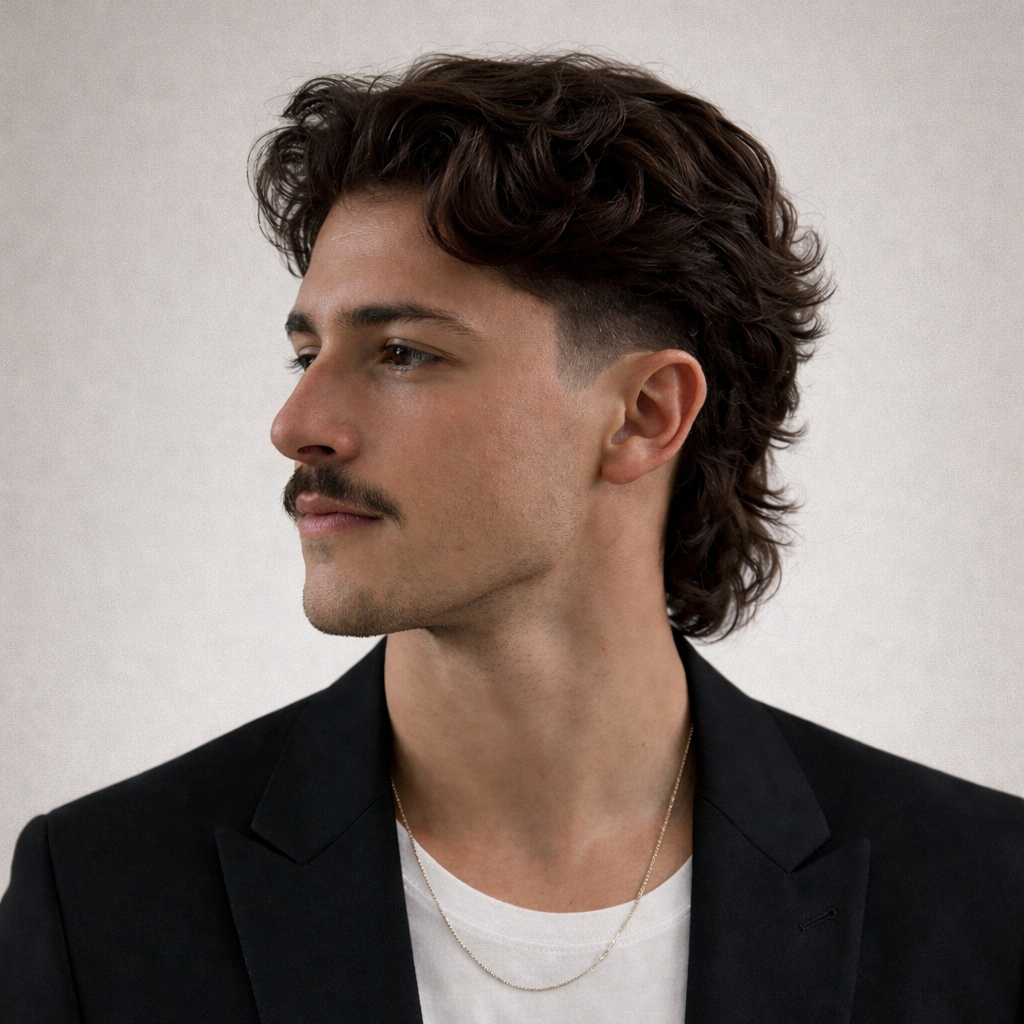
19. French Crop Modern Mullet
The French crop mullet pairs a short, textured fringe with tapered sides and longer mullet length in the back. This hybrid style offers low-maintenance appeal with just enough edge to stand out, making it ideal for guys who want a modern look without daily styling commitments.
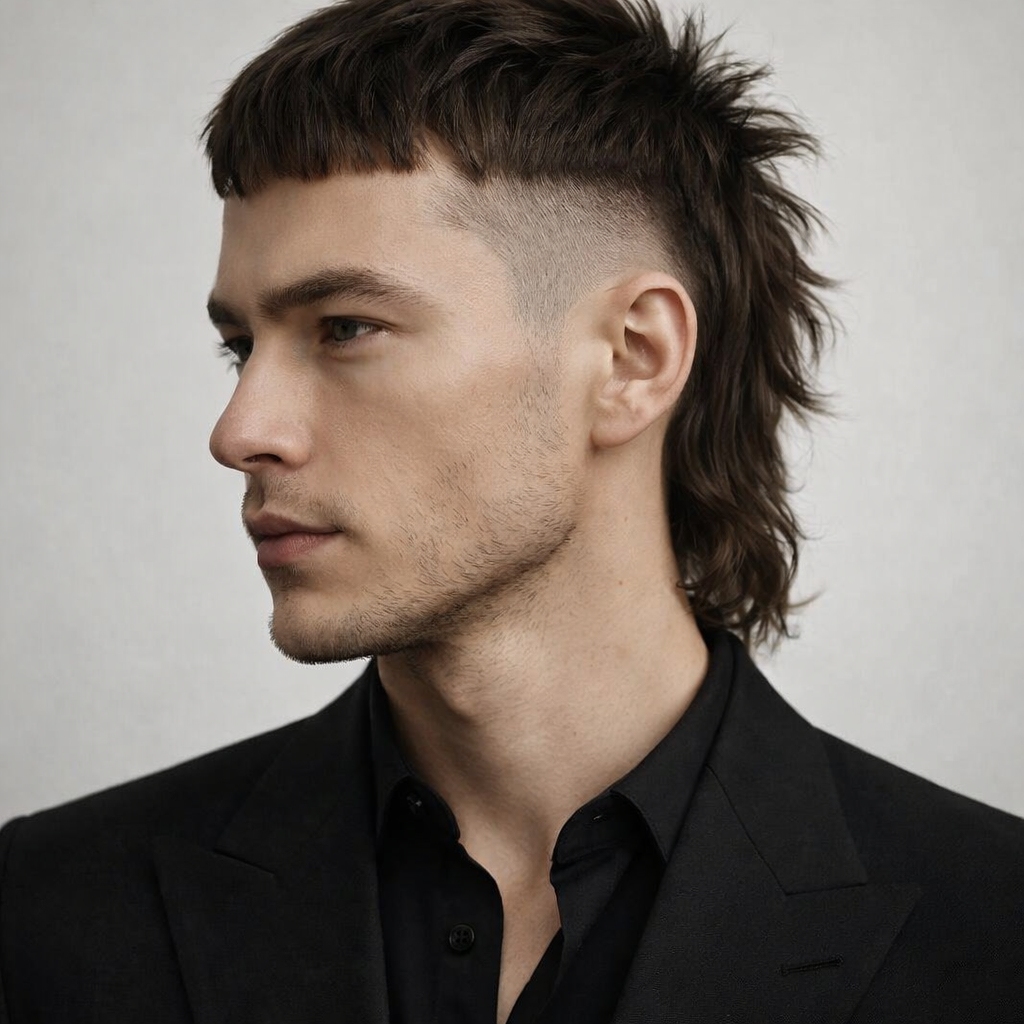
Hair type: Works on all textures, especially straight hair
Maintenance: Every 4-6 weeks
Styling tip: Work a small amount of matte paste through the fringe for texture and definition. The back can be left natural or lightly styled.
20. Mid Taper Modern Mullet
The mid taper mullet features a gradual taper that starts around temple level, creating a balanced contrast between the sides and the longer top and back.
This versatile variation works across most face shapes and offers a clean, contemporary look that’s neither too subtle nor too dramatic.
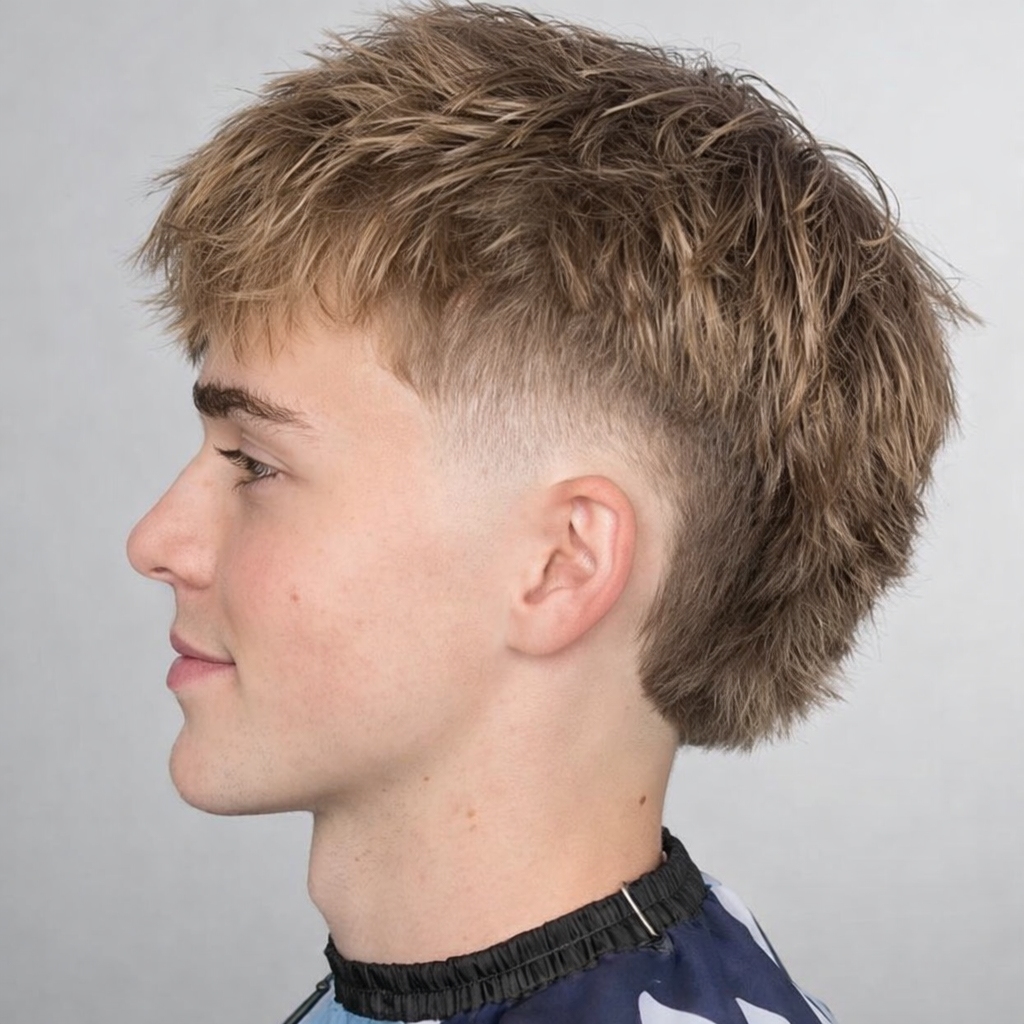
Hair type: All textures
Maintenance: Every 3-4 weeks for taper freshness
Styling tip: Use texturizing spray or sea salt spray on the top and back for natural movement. The taper keeps itself looking clean with regular barber visits.
21. Mohawk Modern Mullet Haircut
The mohawk modern mullet (sometimes called a “mulhawk”) combines a textured, voluminous strip down the center of the head with faded or buzzed sides and flowing length in the back.
It’s an edgy, high-impact style that channels punk energy while staying wearable.
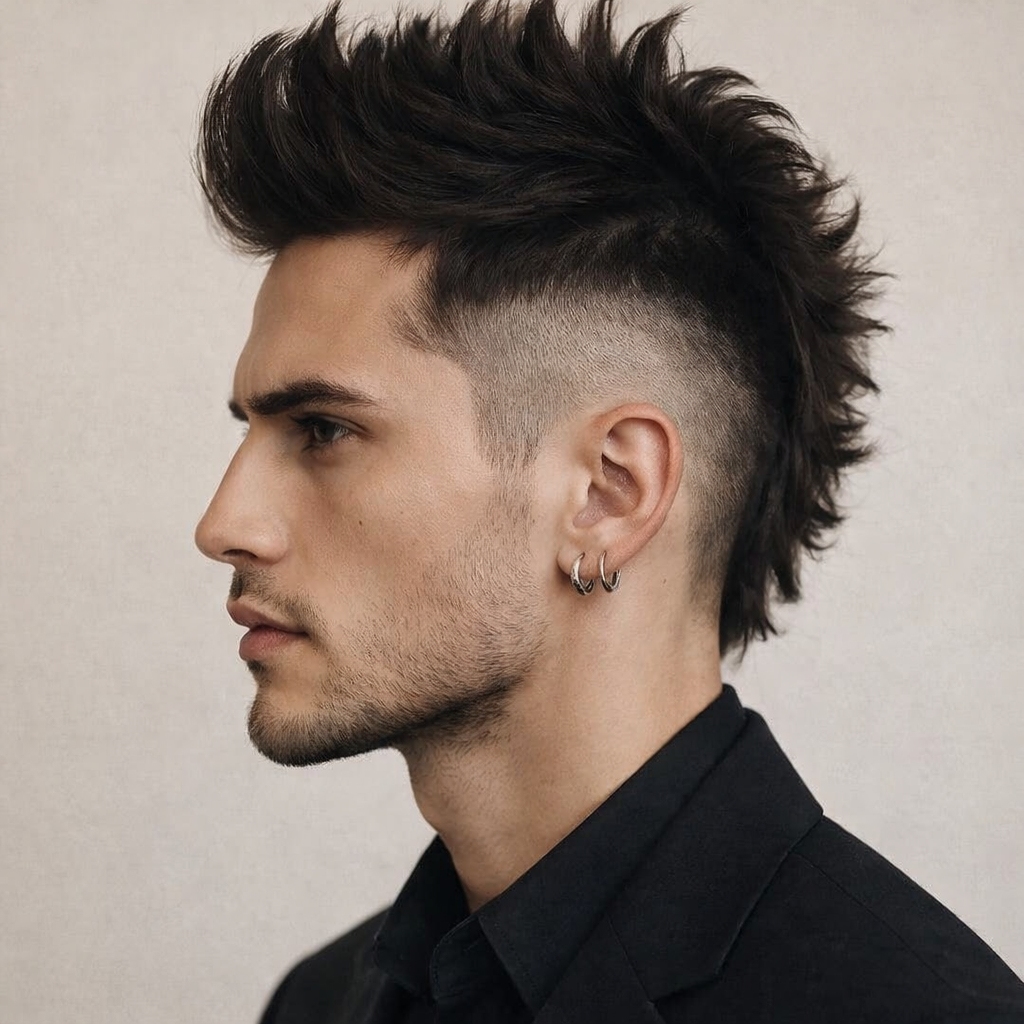
Hair type: Medium to thick hair for volume
Maintenance: Every 3-4 weeks for fade upkeep
Styling tip: Use strong-hold pomade or gel to shape the mohawk section upward, keeping sides clean and the back flowing naturally.
22. Spiky Mullet
The spiky mullet adds vertical texture and edge to the classic cut by styling the top section into defined, upward-pointing spikes while keeping the sides faded and the back flowing.
This high-energy variation works especially well with thicker hair and appeals to guys who want a bold, attention-grabbing look with rock or punk influences.
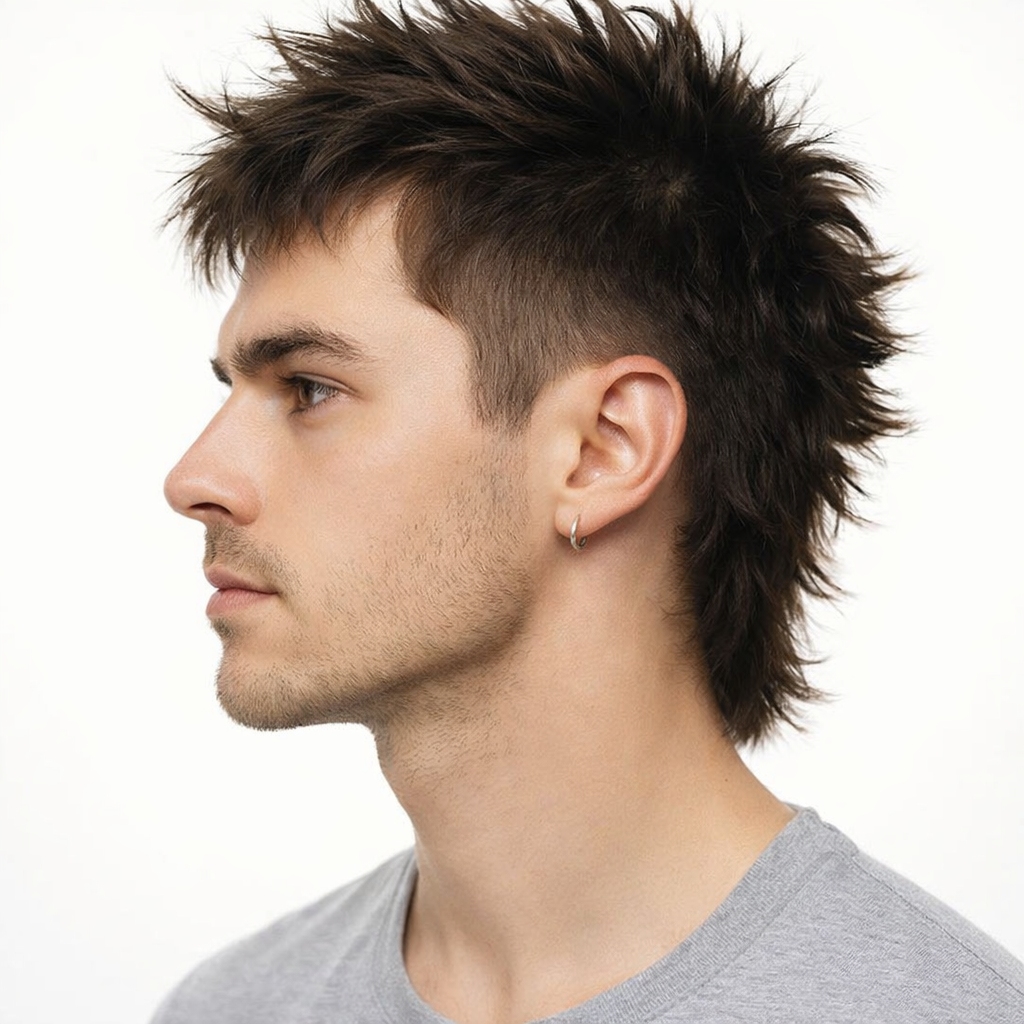
Hair type: Medium to thick, holds texture well
Maintenance: Every 3-4 weeks for fade and shape
Styling tip: Apply strong-hold gel or pomade to damp hair, work through the top section, then use your fingers or a comb to pull hair upward into spikes. Finish with hairspray for all-day hold.
23. Slicked Back Mullet
This hairstyle features a polished top combed smoothly backward, contrasting with the flowing length at the back. The sophisticated, slicked-back hairstyle offers a refined, professional take on the mullet.
Bold enough to stand out but polished enough for business settings or formal occasions.
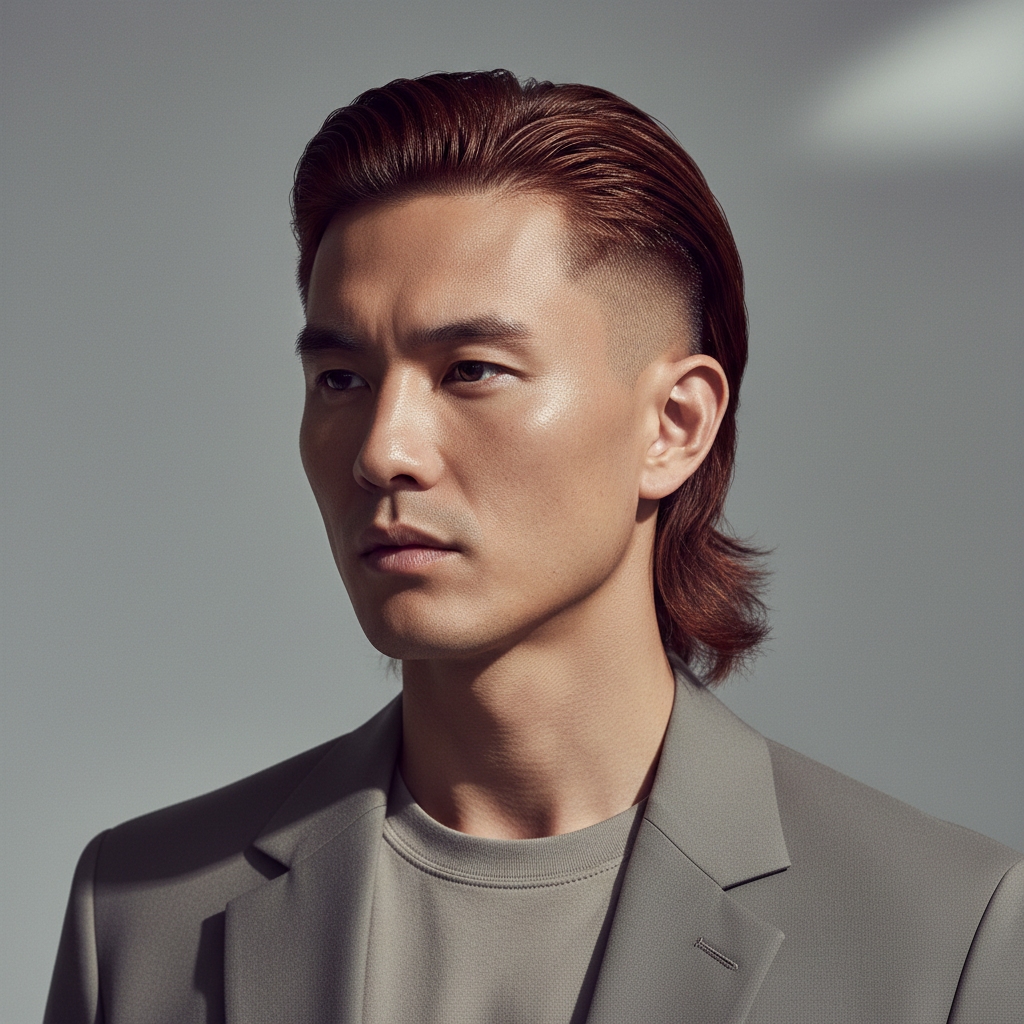
Hair type: Straight to wavy, medium thickness works best
Maintenance: Every 4-5 weeks
Styling tip: Apply medium-hold pomade or styling cream to damp hair and comb back smoothly. Blow-dry for added volume or let air dry for a more natural finish. The back can flow naturally or be styled sleek for extra polish.
24. Permed Modern Mullet
The permed mullet adds chemical texture and volume through a perm treatment, transforming straight hair into defined curls or waves throughout the top and back.
This high-impact variation creates lasting texture without daily styling, offering a bold, retro-inspired look with modern edge.
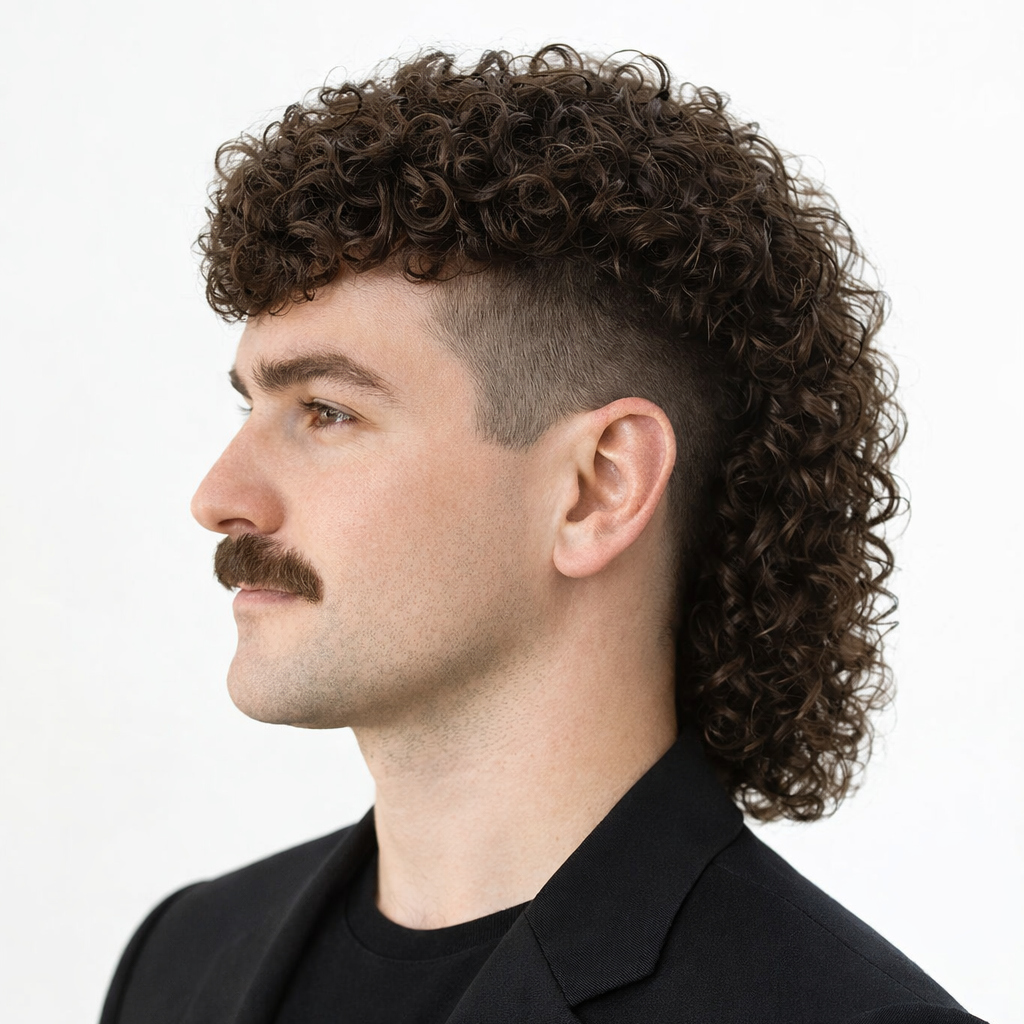
Hair type: Straight hair requiring texture transformation
Maintenance: Every 3-4 months for perm refresh, 4-5 weeks for shape trimming
Styling tip: Use curl cream and scrunch while air-drying or diffusing on low heat. The perm provides built-in texture. Minimal daily styling is needed beyond defining curls with light product.
25. Drop Fade Mullet
The drop fade mullet features a curved fade that drops down behind the ear following the natural head shape, creating a smooth arc from temple to nape.
This technical fade style adds a modern, athletic edge to the mullet while keeping the longer top and back flowing naturally.
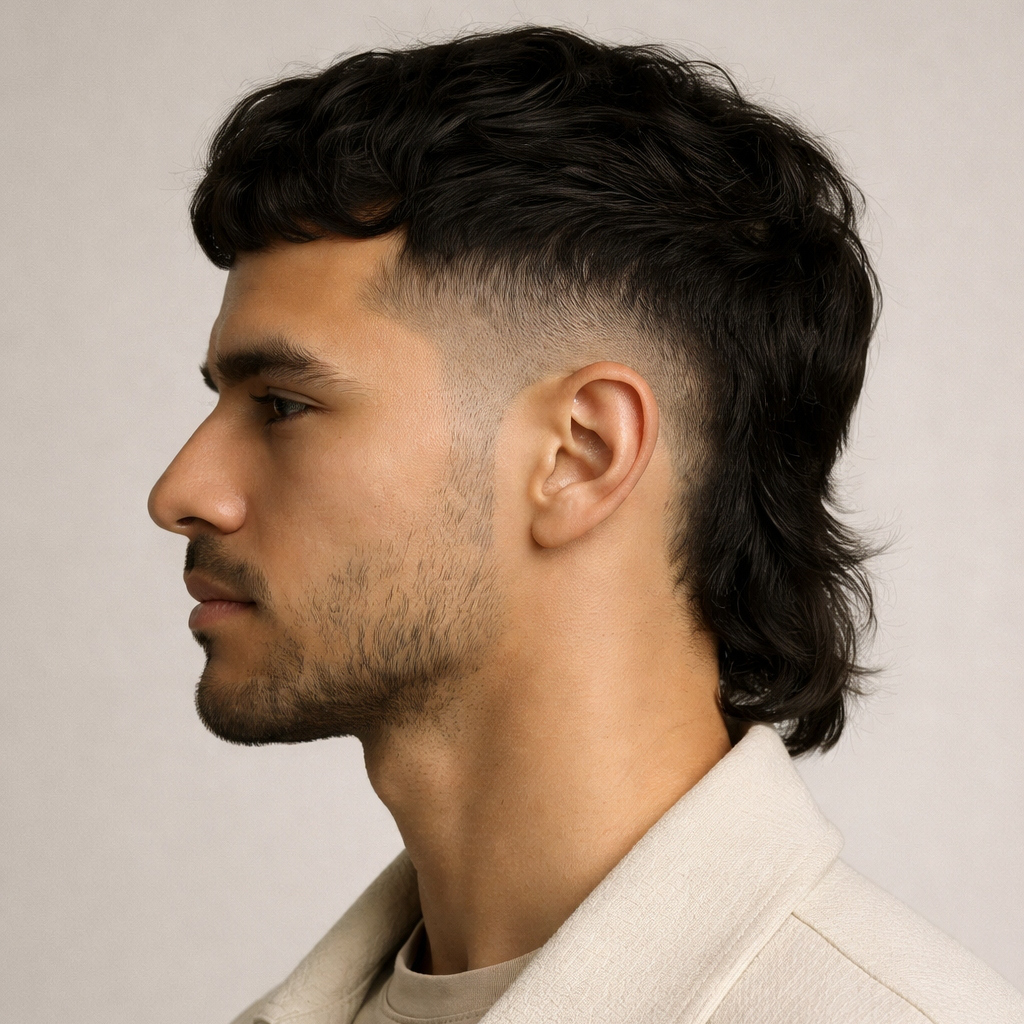
Hair type: All textures, especially effective on curly hair
Maintenance: Every 2-3 weeks for fade precision
Styling tip: The drop fade does most of the visual work. Keep the top textured with light styling cream and let the back flow naturally. Minimal daily styling required.
Frequent Questions:
How is a modern mullet different from a traditional mullet?
The modern version uses precision fades, blended layers, and textured cuts to create a polished, contemporary look. The classic 80s mullet was all about dramatic contrast. Short on top, long in back, with little blending in between. Today’s approach is more refined and versatile.
How often should I get my mullet trimmed?
Every 4-6 weeks is ideal to keep your modern mullet looking sharp. The fade needs regular maintenance, and the layers on top benefit from periodic shaping. If you have a high-maintenance fade like a skin fade, you might need touch-ups every 2-3 weeks.
How do you style a modern mullet?
Styling a modern mullet is all about enhancing texture, creating lift at the crown, and letting the back flow naturally.
Step 1: Start with clean, towel-dried hair.
Pat your hair dry — don’t rub it. Apply a pre-styler like a volumizing mousse or sea salt spray to add body and hold.
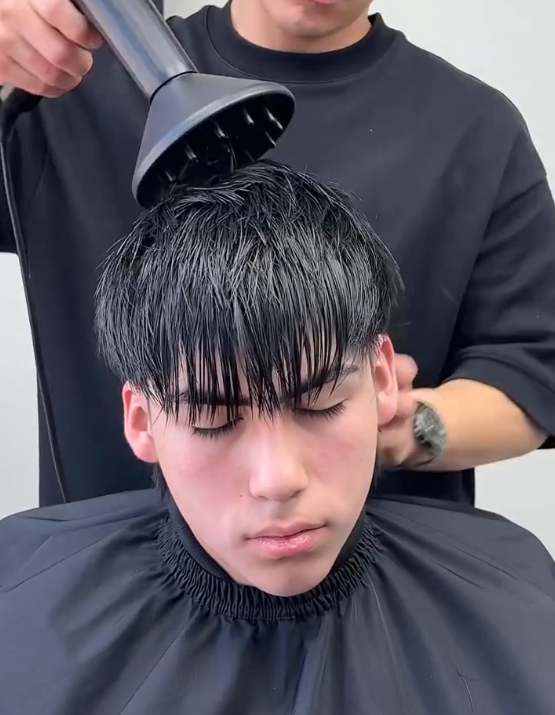
Step 2: Blow dry with intention.
Use a round brush or diffuser, depending on your hair type. Blow-dry the crown upwards and back to create volume, and either flick out the back or let it fall naturally. For fringe or curtain bangs, dry them forward and part with your fingers or a wide-tooth comb.
Step 3: Apply product for definition.
Depending on your style:
- Use matte clay or paste for a choppy, textured finish.
- Use pomade or styling cream for a more defined, wet look.
- Use curl cream or leave-in conditioner for wavy or curly mullets.
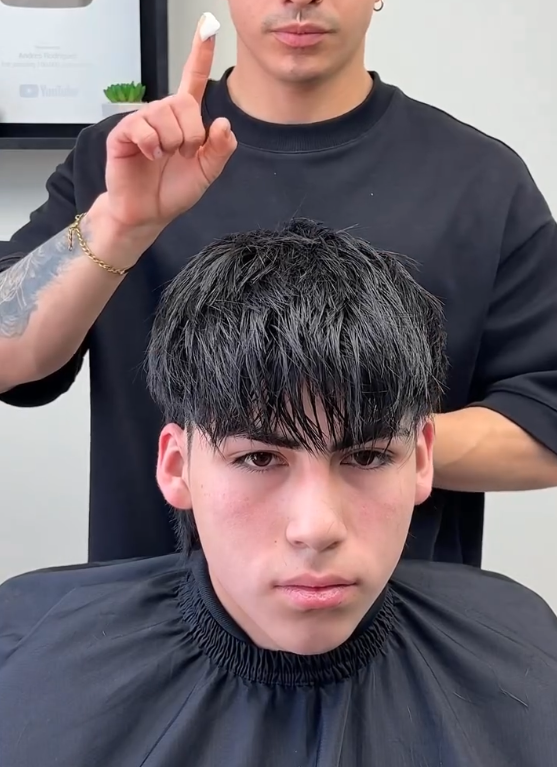
Step 4: Detail the fringe or bangs.
Use your fingertips to style the front — sweep curtain bangs outward, piece them together, or let them fall naturally.
Step 5: Don’t forget the back.
Add a little product to the back to keep it from looking too limp or disconnected. You can twist the ends slightly for a rock-inspired finish or leave it natural for more movement.
Style tip: A little bit of intentional mess goes a long way. The goal is effort-meets-attitude — not too perfect, not too wild.
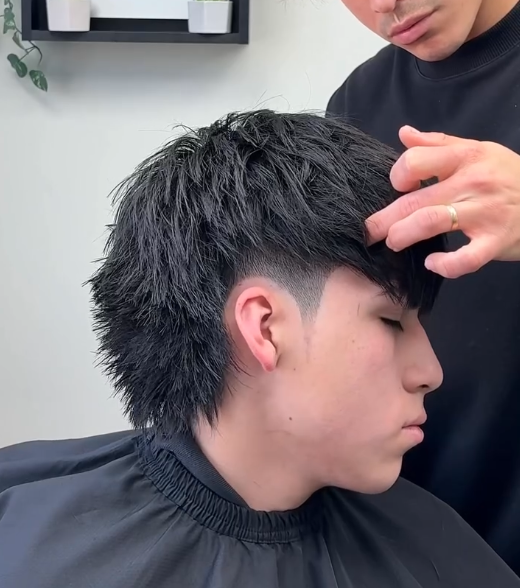
Main product to style your modern mullet:
Sea Salt Spray: A quick spritz for that beachy texture to keep it looking effortless.
Matte Clay: Just enough grip without the glossy shine, perfect for taming the back.
Light Creams: Keeps flyaways in check but doesn’t weigh it down—I tried some on my own hair just to see, and it’s subtle but clutch.
How do you grow a modern mullet?
Start by growing out the back and top evenly while keeping the sides short and neat with regular tapers or fades. A mullet requires intentional shaping — avoid letting the hair grow wild.
How do you ask for a modern mullet at the barbershop?
Be specific. Say you want a modern mullet with shorter, faded or tapered sides, textured layers on top, and a longer length at the back. Mention if you want curtain bangs, a skin fade, a drop fade, or a more subtle taper. It’s always a good idea to show a photo of the exact version you want.
Final Notes
The modern mullet part throwback, part evolution, and honestly, it just works. If your hair’s due for something new, this might be the perfect time to lean in and make the cut.
—Edited by Fernando Lahoz-García, a New York-based fashion art director and M.A. in Journalism and Social Issues
Explore More Mullet Hairstyles:
Mullet Hairstyles for Men: The Iconic Cut Reimagined
The Short Mullet Haircut: A Modern Take on a Classic for Men
Low Taper Mullet, Mid Taper Fade, or High Skin Fade? Breaking Down the Best Mullet Styles
